|
Kick Assiest Blog
Friday, 12 May 2006
Dem Chair Coward Deanpeace Says He Misstated Party Platform On Gays
Mood:
 spacey
Topic: Lib Loser Stories
Dean Misstates Party Platform on Gays spacey
Topic: Lib Loser Stories
Dean Misstates Party Platform on Gays
 Democratic Chairman Howard Dean Mischaracterizes His Party's Platform on Gay Rights
WASHINGTON Democratic Chairman Howard Dean Mischaracterizes His Party's Platform on Gay Rights
WASHINGTON - Democratic chairman Howard Dean mischaracterized his party's platform on gay rights in an interview courting evangelicals, then set the record straight Thursday when an advocacy group called him on it.
Dean told Christian Broadcasting Network News that the 2004 Democratic platform declares "marriage is between a man and a woman" just one of the points he made in reaching out to religious conservatives who are largely hostile to the party.
But the platform does not define marriage that way, and his remarks prompted the National Gay and Lesbian Task Force to return a $5,000 donation from the Democratic National Committee.
Dean later acknowledged his misstatement, but the group sent back the money anyway. "We need for Governor Dean to demonstrate real leadership on our issues," executive director Matt Foreman said in an interview, "not to equivocate depending on the audience."
 Dean sought to establish common ground with religious conservatives in the interview on Pat Robertson's network, a tall order considering their opposition to the Democratic Party's positions on abortion rights, gay rights and some other social issues.
Dean said that "one of the misconceptions about the Democratic Party is that we're godless and that we don't have any values."
He went on: "The truth is, we have an enormous amount in common with the Christian community, and particularly with the evangelical Christian community. And one of the biggest things that Democrats worry about is the materialism of our country, what's on television that our kids are seeing, and the lack of spirituality."
With Republicans embracing the traditional definition of marriage in 2004, Democrats sought to appeal to such traditionalists without giving up their support for gay rights.
 The result: a platform plank that left the central question about what defines marriage to the states, and specifically rejected President Bush's support for a constitutional amendment to ban same-sex marriage.
It asserted: "We support full inclusion of gay and lesbian families in the life of our nation and seek equal responsibilities, benefits, and protections for these families."
Dean stated in the interview: "The Democratic Party platform from 2004 says that marriage is between a man and a woman. That's what it says."
He added that the party differs with some religious leaders in believing "everybody deserves to live with dignity and respect, and that equal rights under the law are important."
After the gay rights group went public with its complaints about his remarks, Dean acknowledged: "I misstated the Democratic Party's platform, which does not say marriage should be limited to a man and a woman," and reasserted the party's commitment to equal protection for all.
 Foreman said Dean should be persuading Democrats to fight against ballot initiatives seeking to ban gay marriage, but instead has misrepresented the party's "important and affirming plank" several times.
"There has been a disturbing lack of clarity from Governor Dean about where we fit into the party and the country," he said after Dean corrected himself.
Foreman said the $5,000 was for sponsorship of the group's leadership awards dinner in Washington last week, and will be missed.
On the Net: Account of Dean interview ---- National Gay and Lesbian Task Force
ABC News ~ Associated Press - Calvin Woodward ** Dean Misstates Party Platform on Gays
Posted by yaahoo_2006iest
at 3:58 PM EDT
Updated: Friday, 12 May 2006 4:02 PM EDT
'Paralyzed' woman gets up, runs from police
Mood:
 silly
Topic: Funny Stuff
"Paralyzed" woman gets up, runs from police silly
Topic: Funny Stuff
"Paralyzed" woman gets up, runs from police
 LOS ANGELES LOS ANGELES - A wheelchair-bound Los Angeles woman, who has repeatedly filed lawsuits over access for the disabled, got up and ran after police arrested her for fraud, authorities said on Thursday.
Laura Lee Medley, 35, had sued in at least four California cities over injuries she claimed she sustained while trying to navigate her wheelchair before she was suspected of fraud.
Medley, who claimed to be paralyzed from a drunk driving accident, was tracked to Las Vegas where police there took her into custody and then, when she complained of medical issues, to a local hospital, Long Beach prosecutor Belinda Mayes said.
 "She gets to the hospital and while she's waiting for an examination, she gets up from the chair and runs," Mayes said. "Somebody remarked, 'That's where the great miracle occurred."'
Medley sprinted through the hospital corridors but was quickly apprehended by police and booked pending extradition to San Bernardino, southern California, where she is facing charges of filing false documents, attempted grand theft and insurance fraud.
Medley has sued the cities of Long Beach and South Pasadena and counties of San Bernardino and Riverside over various injuries she claimed she sustained in her wheelchair. She was also being sought on arrest warrants by the states of Oregon and Washington, Mayes said.
My Way News ~ Reuters ** "Paralyzed" woman gets up, runs from police
Posted by yaahoo_2006iest
at 3:42 PM EDT
Thursday, 11 May 2006
RFK & JFK Wiretapped Martin Luther King, Jr.
Mood:
 loud
Topic: Lib Loser Stories loud
Topic: Lib Loser Stories
January 31, 2006
Who Filibustered Civil Rights and Wiretapped MLK?
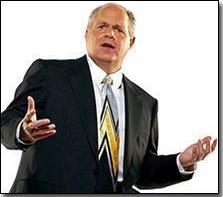  ‡
BEGIN TRANSCRIPT
RUSH: Brad in Chicago. You're next on the Rush Limbaugh program. Nice to have you on the program, sir.
CALLER: Hi, Rush. How you doing?
RUSH: Fine, thank you.
CALLER: Listen, man, I am fired up about Schumer right now. Did I hear it right, did he basically call us racists?
RUSH: Well, you're talking about, let's see, (scanning Schumer statement) "Tonight when the president announced -- many will rejoice at Judge Alito --" blah, blah, blah...
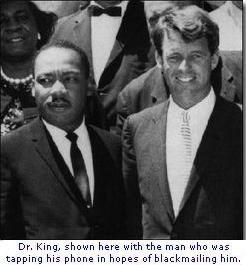 CALLER: Did he say something about discrimination?
RUSH: "Millions of Americans will be at risk of losing their day in court when they suffer the yolk of discrimination." I don't think -- not racists -- he's calling us bigots overall. Women are going to lose their rights. Humans are going to lose their rights. Workers are going to lose their rights. Animals are going to lose their rights. Everybody is going to lose their rights. We're going to die. We're all going to be shipped down to Club Gitmo and that's it. We're dead; we're all going to be imprisoned.
CALLER: This is why we can't come together as a country. I mean, do you hear Republicans saying anything like this? I mean, I'm sure there's a friend or two, there's a Pat Robertson, but for the most part you don't hear people being incendiary about Democrats on the Republican side.
RUSH: Well, you know you mentioned Pat Robertson. Look, Pat Robertson can say whatever he wants and it will be news for two days about what a kook he is, and they'll go talk to Republicans, "Don't you think you should distance yourself from this man? Don't you think this man should shut up? 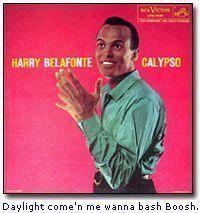 Don't you think this man is embarrassing?" Harry Belafonte comes out, calls Bush a terrorist, worse than Hitler, blah, blah, blah, says that the Patriot Act is the equivalent of Nazism or whatever he said, he gets two days of serious analysis on CNN and the other cable channels. So it is what it is. Chuck Schumer is just a fading liberal who realizes he's in the minority. I think if you want to talk about racism, listen to Ted Kennedy here. We played this bite earlier, but this is old Ted, and he's screaming on the floor of the Senate yesterday, before the cloture vote.
KENNEDY: Our Founding Fathers failed the test when they wrote slavery into the Constitution. Abraham Lincoln pointed the way, and we passed the 13th, 14th, Fifteenth Amendment and had the Civil War but we didn't resolve this issue. It was only 'til we had the courage of those members of what branch of government? Not the United States Congress, not the United States Senate, not the executive, the judiciary, the Fifth Circuit. We're talking now about the Supreme Court! But they are the ones that changed this country inevitably with what we call the march toward progress.
 RUSH: So here's Senator Kennedy again admitting what the court represents to liberals. It's the way to get what they believe enacted as law since they can't pass those laws democratically in legislative bodies. But Senator Kennedy leaves out something very important here, and it's this, ladies and gentlemen. The only reason that civil rights had to go to the courts was because of Democrats back in the fifties and sixties in that very same precious Senate of which Senator Kennedy is a member. They filibustered civil rights back in the sixties. They filibustered against civil rights legislation. Democrat governors stood in schoolhouse doors to disobey the executive branch. Democrat chiefs of police like Bull Connor turned fire hoses loose. Democrats were beating up congressman John Lewis back when he was marching with Dr. Martin Luther King. It was the Democrats back then who were standing in the way of the passage of civil rights, which is why it had to go to the courts.
 Senator Kennedy conveniently leaves that out, because the modern mantra is that it's Republicans who were racists. It was Republicans who don't want civil rights. It was Republicans who stood in the way of the Civil Rights Act. A greater percentage of Republican senators voted for the Civil Rights Act than did Democrats. Bill Clinton's icon, his mentor, J. William Fulbright, led one of the Senate measures to oppose civil rights. Big segregationist. All these southern Democrats were huge segregationists, and that's why it had to go to the courts, because the legislatures, the Congress and the Senate back then, run by Democrats, were the obstacle to civil rights. That's history.
 BREAK TRANSCRIPT
RUSH: You know, Coretta Scott King died today. And there's all this coverage. I mean, I'm not critical of the coverage, but I just think it's ironic. I just think it's as hypocritical as can be because here's Coretta Scott King being lionized and deified practically today, but none, zilch, zero, nada of the reporting is mentioning who it was that wiretapped her husband, the Reverend Martin Luther King, Jr., for the purposes of destroying his marriage. It was good old Bobby Kennedy. Party? Democrat. Year? Sixties. Same year that Democrats in the Senate are fighting the Civil Rights Act.
 So they're wiretapping Martin Luther King. They were spying, domestic spying, Bobby Kennedy, because the rumors were that Martin Luther King had mistresses all over the place and they wanted to find them, and they wanted to discredit Martin Luther King. The Kennedy administration, for the purposes of making it all public and destroying his marriage. Today, they lionize Coretta Scott King but leave out an interesting, I'd say 75%, of the story.
END TRANSCRIPT
 Read the Background Material...
(Reuters: Rights leader Coretta Scott King dies)
The Real Record on Race...
(Democrat Filibusters Blocked Anti-Lynching Laws -06.15.05)
(NAALCP & Democrats - Alliance of Elites -07.15.04)
(KKK Byrd's Lost MLK Tape -01.20.04)
(JFK & RFK Tried to Stop March on Washington! -08.28.03)
(DNC Fires Black Workers First -05.29.03)
(Tom Daschle's Racist Slip -05.23.03)
(MLK Would Not Want a Day Off -01.17.03)
(Nixon Implemented Affirmative Action! –12.16.02)
("Throm Sturmond" & Dixiecrats Were Democrats –12.13.02)
(SPECIAL: Party of Lincoln is Not the Racist Party –12.12.02)
(Bill Clinton's Racist Roots -11.08.01) Read the Background Material...
(Reuters: Rights leader Coretta Scott King dies)
The Real Record on Race...
(Democrat Filibusters Blocked Anti-Lynching Laws -06.15.05)
(NAALCP & Democrats - Alliance of Elites -07.15.04)
(KKK Byrd's Lost MLK Tape -01.20.04)
(JFK & RFK Tried to Stop March on Washington! -08.28.03)
(DNC Fires Black Workers First -05.29.03)
(Tom Daschle's Racist Slip -05.23.03)
(MLK Would Not Want a Day Off -01.17.03)
(Nixon Implemented Affirmative Action! –12.16.02)
("Throm Sturmond" & Dixiecrats Were Democrats –12.13.02)
(SPECIAL: Party of Lincoln is Not the Racist Party –12.12.02)
(Bill Clinton's Racist Roots -11.08.01)
*Note: Links to content outside Rush Limbaugh.com usually become inactive over time.
Rush Limbaugh.com ** Who Filibustered Civil Rights and Wiretapped MLK?
Related: Senator Roberts Sends Letter to Coward Deanpeace, Cites RFK Wiretapping MLK
Posted by yaahoo_2006iest
at 12:01 AM EDT
Updated: Friday, 12 May 2006 3:32 PM EDT
Study: Rush Limbaugh Dominates Talk Radio
Mood:
 special
Topic: News special
Topic: News
 Study: Rush Limbaugh Dominates Talk Radio Study: Rush Limbaugh Dominates Talk Radio
Talk-show host Rush Limbaugh still dominates the radio talk show business, a new study finds.
According to a recently released survey by the Benchmark Company, Limbaugh was "the most widely identified radio talk-show host" in America - with some 94 percent of Americans indicating they know who he is.
Satellite radio shock jock Howard Stern was a close second, with 89 percent of Americans saying they could identify him.
 But the Benchmark study also noted a general decline in the ability of regular talk radio listeners to identify other nationally syndicated hosts.
"With the exception of a few, well-established icons like Limbaugh and Stern, it may well be that the number of nationally syndicated radio hosts has gone past the point where the average listener can absorb all the names," said Dr. Rob Balon, CEO of Benchmark.
The study of 1120 regular listeners of AM and FM talk radio was the third installment in the Benchmark series on talk radio that began in 1994.
In addition, the study found that there were more listeners who classified themselves as political moderates and fewer who identified themselves as conservatives.
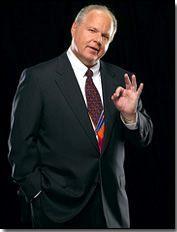 Another surprising finding was the perceived importance of local radio talk hosts. Sixty-nine percent of respondents mentioned a local host when asked who their favorite radio personality was.
"Local hosts talk about things that impact folks on their own turf," explained Balon. "Sometimes it is politics, sometimes water cooler stuff, but it is what the listener relates to."
The study also addressed the role of the Internet and of technology in talk radio. 49 percent of respondents said they'd consider a monthly subscription if their favorite host went to a satellite station. And 65 percent mentioned visiting their favorite talk station's Web site while 19 percent said they at least occasionally listened online.
News Max.com ~ Carl Limbacher ** Study: Rush Limbaugh Dominates Talk Radio
Posted by yaahoo_2006iest
at 12:01 AM EDT
Updated: Friday, 12 May 2006 6:58 AM EDT
1999: Questions About Echelon
Mood:
 chatty
Topic: Lib Loser Stories
Lawmakers Raise Questions About International Spy Network chatty
Topic: Lib Loser Stories
Lawmakers Raise Questions About International Spy Network
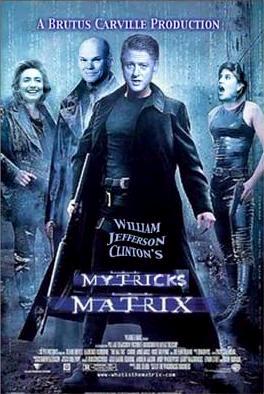 An international surveillance network established by the National Security Agency and British intelligence services has come under scrutiny in recent weeks, as lawmakers in the United States question whether the network, known as Echelon, could be used to monitor American citizens.
Last week, the House Committee on Intelligence requested that the National Security Agency and the Central Intelligence Agency provide a detailed report to Congress explaining what legal standards they use to monitor the conversations, transmissions and activities of American citizens.
The request is part of an amendment to the annual intelligence budget bill, the Intelligence Reauthorization Act. It was proposed by Bob Barr, a Georgia Republican and was supported by the chairman of the House Intelligence Committee, Porter Goss, a Florida Republican. The amendment was passed by the House on May 13 and will now go before the Senate.
Barr, a former CIA analyst, is part of a growing contingent in the United States, Europe and Australia alarmed by the existence of Echelon, a computer system that monitors millions of e-mail, fax, telex and phone messages sent over satellite-based communications systems as well as terrestrial-based data communications. The system was established under what is known as the "UKUSA Agreement" after World War II and includes the security agencies of the United States, Britain, Canada, Australia and New Zealand.
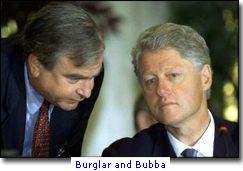 Although Echelon was originally set up as an international spy network, lawmakers are concerned that it could be used to eavesdrop on American citizens.
"I am concerned there are not sufficient legal mechanisms in place to protect our private information from unauthorized government eavesdropping through such mechanisms as Project Echelon," Barr said in an interview on Tuesday.
The finished report will outline the legal bases and other criteria used by United States intelligence agencies when assessing potential wiretap targets. It will be submitted to the House and made available to the public.
"If the agencies feel unable to provide a full account to the public, then a second classified report will be provided to the House Committee on Intelligence," Barr said. "This is to stop the agencies hiding behind a cloak of secrecy."
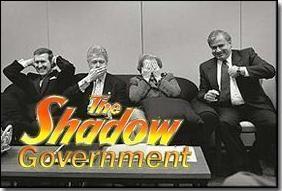 Judith Emmel, chief of public affairs for the NSA, declined to comment about the UKUSA Agreement but said the agency was committed to responding to all information requests covered by Barr's amendment. "The NSA's Office of General Counsel works hard to ensure that all Agency activities are conducted in accordance with the highest constitutional, legal and ethical standards," she said.
Until last Sunday, no government or intelligence agency from the member states had openly admitted to the existence of the UKUSA Agreement or Echelon. However, on a television program broadcast on Sunday in Australia, the director of Australia's Defence Signals Directorate acknowledged the existence of the agreement. The official, Martin Brady, declined to be interviewed for the " Sunday Program," but provided a statement for its special on Echelon. "DSD does cooperate with counterpart signals intelligence organizations overseas under the UKUSA relationship," the statement said  .
Meanwhile, European Parliament officials have also expressed concern about the use of Echelon to gather economic intelligence for participating nations. Last October, the spying system came to the attention of the Parliament during a debate on Europe's intelligence relationship with the United States. At that time, the Parliament decided it needed more information about Echelon and asked its Science and Technology Options Assessment Panel to commission a report.
The report, entitled " Development of Surveillance Technology and Risk of Abuse of Economic Information", was published on May 10 and provides a detailed account of Echelon and other intelligence monitoring systems.
 According to the report, Echelon is just one of the many code names for the monitoring system, which consists of satellite interception stations in participating countries. The stations collectively monitor millions of voice and data messages each day. These messages are then scanned and checked against certain key criteria held in a computer system called the "Dictionary." In the case of voice communications, the criteria could include a suspected criminal's telephone number; with respect to data communications, the messages might be scanned for certain keywords, like "bomb" or "drugs." The report also alleges that Echelon is capable of monitoring terrestrial Internet traffic through interception nodes placed on deep-sea communications cables.
While few dispute the necessity of a system like Echelon to apprehend foreign spies, drug traffickers and terrorists, many are concerned that the system could be abused to collect economic and political information.
"The recent revelations about China's spying activities in the U.S. demonstrates that there is a clear need for electronic monitoring capabilities," said Patrick Poole, a lecturer in government and economics at Bannock Burn College in Franklin, Tenn., who compiled a report on Echelon for the Free Congress Foundation. "But those capabilities can be abused for political or economic purposes so we need to ensure that there is some sort of legislative control over these systems."
 On the "Sunday Program" special on Echelon, Mike Frost, a former employee of Canada's Communications Security Establishment, said that Britain's intelligence agency requested that the CSE monitor the communications of British government officials in the late 1980s. Under British law, the intelligence agency is prohibited from monitoring its own government. Frost also said that since the cold war is over, the "the focus now is towards economic intelligence."
Still, Echelon has been shrouded in such secrecy that its very existence has been difficult to prove. Barr's amendment aims to change that.
"If this report reveals that information about American citizens is being collected without legal authorization, the intelligence community will have some serious explaining to do," Barr said.
NY Times ~ Niall McKay ** Lawmakers Raise Questions About International Spy Network
Related: This Blog *** Clintax's Other Domestic Spying Program, The Tip Of The Iceberg
Clintax spied on pro-life groups, religious groups... his political enemies.
Posted by yaahoo_2006iest
at 12:01 AM EDT
Updated: Friday, 12 May 2006 8:50 AM EDT
FDR's Domestic Surveillance
Mood:
 loud
Topic: Yahoo Chat Stuff loud
Topic: Yahoo Chat Stuff
 FDR's Domestic Surveillance FDR's Domestic Surveillance
In a bold and controversial decision, the president authorized a program for the surveillance of communications within the United States, seeking to prevent acts of domestic sabotage and espionage. In so doing, he ignored a statute that possibly forbade such activity, even though high-profile federal judges had affirmed the statute's validity. The president sought statutory amendments allowing this surveillance but, when no such legislation was forthcoming, he continued the program nonetheless. And when Congress demanded that he disclose details of the surveillance program, the attorney general said, in no uncertain terms, that it would get nothing of the sort.
In short, President Franklin Delano Roosevelt charted a bold course in defending the nation's security in 1940, when he did all of these things.
It is worth remembering FDR's example as the debate over the NSA's warrantless surveillance continues to heat up. After a few months' lull, it seems that the issue is again creeping into the headlines. On April 27, for example, Senate Judiciary Committee Chairman Arlen Specter convened a press conference demanding that President Bush disclose the details of the NSA's surveillance program, and threatening to suspend the program's funding.
 As with so many issues central to the global war on terror in which the need for security must be balanced against individual liberties, there is no fool-proof answer to the questions raised by the NSA's surveillance program. Yet broad sections of the left have personalized this debate around President Bush. Their hatred and distrust of Bush drives them to see the administration's actions in the worst light possible. To that extent, it's important to understand how President Roosevelt -- a paragon of the left -- dealt with similar problems.
President Bush faces challenges on two fronts. First, it's been argued that there is no authority for the NSA surveillance, either statutory or constitutional. Second, congressional critics demand that the administration disclose the details of the surveillance program. The Roosevelt administration faced similar challenges in the days leading up to World War II. Documents that we obtained from Justice Robert Jackson's archives at the Library of Congress, some of which have never before been discussed in the press, show that President Roosevelt did not doubt his authority to conduct such surveillance in the interest of national security.
 In 1937 and 1939, the Supreme Court handed down a pair of decisions in the matter of Nardone v. United States. The Court held that the Communications Act of 1934 barred federal surveillance of telephone lines, and that evidence obtained from such surveillance couldn't be introduced at trial.
In response, Attorney General (and future Supreme Court justice) Robert Jackson ended the FBI's longstanding surveillance of suspected saboteurs and spies. FBI director J. Edgar Hoover protested this decision. In an April 13, 1940 memorandum to Jackson, Hoover outlined a number of pending investigations that were hampered by Jackson's decision. Hoover concluded, "Frankly, the Bureau cannot cope with this problem without the use of wire taps and I feel obligated to bring this situation to your attention at the present time rather than to wait until a national catastrophe focuses the spotlight of public indignation upon the Department because of its failure to prevent a serious occurrence."
President Roosevelt sided with Hoover, not Jackson. In a signed May 21, 1940 memorandum to his attorney general, FDR wrote:
I have agreed with the broad purpose of the Supreme Court decision relating to wire-tapping in investigations. The Court is undoubtedly sound both in regard to the use of evidence secured over tapped wires in the prosecution of citizens in criminal cases; and is also right in its opinion that under ordinary circumstances wire-tapping by Government agents should not be carried on for the excellent reason that it is almost bound to lead to abuse of civil rights.
However, I am convinced that the Supreme Court never intended any dictum in the particular case which it decided to apply to grave matters involving the defense of the nation.
It is, of course, well known that certain other nations have been engaged in the organization of propaganda of so-called "fifth columns" in other countries and in preparation for sabotage, as well as in actual sabotage.
It is too late to do anything about it after sabotage, assassinations and "fifth column" activities are completed.
You are, therefore, authorized and directed in such cases as you may approve, after investigation of the need in each case, to authorize the necessary investigating agents that they are at liberty to secure information by listening devices direct to the conversation or other communications of persons suspected of subversive activities against the Government of the United States, including suspected spies. You are requested furthermore to limit these investigations so conducted to a minimum and to limit them insofar as possible to aliens.
 FDR's assertion that the Supreme Court didn't read the Communications Act to bar surveillance for national defense wasn't based on the statute's text. The Communications Act provided that "no person not being authorized by the sender shall intercept any communication and divulge or publish the existence, contents, substance, purport, effect, or meaning of such intercepted communication to any person." The only source for FDR's national-security exception was the same as the one now presented as a defense of the NSA surveillance program: the president's inherent constitutional authority, as commander in chief of the armed forces, to conduct surveillance as an incident to the military's defense of our nation.
 Despite FDR's readiness to use his inherent authority, he and Jackson pushed Congress to give the administration statutory authority. As Jackson recounted in his memoir, the administration sought authorization for surveillance for not only "espionage [and] sabotage," but also "extortion and kidnapping cases." The House was willing only to authorize FBI wiretapping "in the interest of national defense." As today, any such legislation was opposed by the ACLU, as well as (in Jackson's words) "others of liberal persuasion."
FDR and Jackson also opposed those who sought to require that surveillance be approved not only by the attorney general but also by the courts, through warrant requirements. As Jackson wrote in a March 19, 1941 letter to Rep. Hatton Summers, "I do not favor the search warrant procedure.... Such procedure means loss of precious time, probably publicity, and filing of charges against persons as a basis for wire tapping before investigation is complete which might easily result in great injury to such persons."
 In the end, FDR and the Congress weren't able to agree on a legislative compromise. Nonetheless, President Roosevelt continued to authorize national-security surveillance. All of this predated America's entry into the Second World War.
After choosing to authorize surveillance, President Roosevelt faced angry legislators (similar to Senator Specter and others today) who called for disclosure of the surveillance program's details in order to inform the legislative debate. FDR decided that Congress was not entitled to, and could not be trusted with, such information. He thus refused to comply.
 Attorney General Jackson spelled this out in an April 30, 1941 letter to Rep. Carl Vinson, Chairman of the House Committee on Naval Affairs. Jackson reviewed the history of presidential refusals to disclose national security information, beginning with President Washington's 1796 refusal to disclose the details of treaty negotiations. Jackson warned that to provide such information to Congress would enable congressional personnel to leak details to the public, thereby tipping off targets and embarrassing informants. He said that disclosure would "prejudice the national defense and be of aid and comfort to the very subversive elements against which you wish to protect the country." And despite the fact that Congress was attempting to pass legislation pertaining to that very program, Jackson concluded that information regarding the surveillance "can be of little, if any, value in connection with the framing of legislation or the performance of any other constitutional duty of the Congress."
Jackson recognized that the president and Congress face different responsibilities, making agreement between the two branches difficult on such weighty, heated, time-sensitive issues. The Constitution gives the president the responsibility to act quickly and decisively to defend the national security. Congress, freed from such responsibility, could indulge other preoccupations. At one point, Jackson wrote Rep. John Coffee that "I am confident that if you and any of the other liberals in Congress sat in my seat and were held to some degree of responsibility for the perpetration of acts of sabotage and espionage in this country you would feel differently about the wire tapping bill."
 And so it goes today. In the coming weeks, Senator Specter and others may threaten to withhold funds from the NSA or block nominations (such as General Hayden's nomination to head the CIA). The prerogatives of spending cuts and nominations blocks are within the power of the Congress, just as defense of the national security is committed to the president. President Bush can only hope that cooler heads prevail among House and Senate majorities. But in pursuing his own course of action, President Bush should keep in mind -- and cite as justification -- the example of the opposition party's greatest hero, President Roosevelt.
Adam White's review of Justice Robert Jackson's draft opinions in the famous Korean War-era Steel Seizure Cases will appear in the Albany Law Review later this year; his defense of the Senate's power to filibuster judicial nominations appeared last year in the Harvard Journal of Law & Public Policy. Daveed Gartenstein-Ross is an attorney and counterterrorism consultant. His first book, My Year Inside Radical Islam, will be published in winter 2007 by Tarcher/Penguin.
American Spectator ~ Adam White and Daveed Gartenstein-Ross ** FDR's Domestic Surveillance
Related: November 28, 2001 Op-Ed; Washington Post ~ Rush Limbaugh ** Bush's FDR Example
Posted by yaahoo_2006iest
at 12:01 AM EDT
Updated: Friday, 12 May 2006 10:18 AM EDT
Wednesday, 10 May 2006
Saddam Hussein's Terrorist Blueprints, Why his sponsorship of terror doesn't make the papers
Mood:
 loud
Topic: Yahoo Chat Stuff loud
Topic: Yahoo Chat Stuff
 Saddam's Terrorist Blueprints Saddam's Terrorist Blueprints
By Joel Mowbray
Ask even news-savvy Americans what they know about Saddam's plans to deploy suicide bombers against the West, and the most common response will be blank stares. Ditto for asking about how Saddam's thugs trained thousands of terrorists from around the Arab world, right up through 2002.
 ↓
Both stunning revelations surfaced recently, one in Congressional testimony last month and the other in the current issue of Foreign Affairs magazine. The Pentagon has known about these items on Saddam's terrorist agenda since the end of 2003, which is when it received the after-action analysis report it had commissioned. (It served as the basis for the testimony and the magazine article.)
Now declassified, the book-length report analyzed thousands of Iraqi documents and interviews with over 100 officials of Saddam's regime to piece together what was going on in the tyranny's final days. Much of it is darkly humorous, such as the lengths to which minions would go to deceive Saddam or how the despot actually appeared to believe the ridiculous propaganda spewed by Baghdad Bob.
To the extent the report or its summaries were covered by the mainstream media, attention mostly was focused on the finding that Saddam apparently behaved himself in late 2002 and early 2003 in a vain attempt to stave off the invasion. Yet entirely ignored by the supposedly objective news outlets were the rather newsworthy items indicating that, in fact, Saddam was interested in exporting terror.
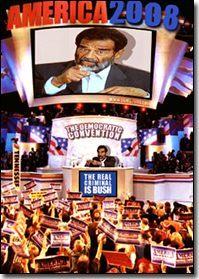 According to a Nexis search, only four news outlets have even mentioned "Blessed July," which was, in the words of the Foreign Affairs article, "a regime-directed wave of 'martyrdom' operations against targets in the West." All nine articles were editorials or opinion pieces. The New York Times essentially avoided covering the report or the magazine summary of it, as the paper instead excerpted a book co-authored by one of its reporters that relied heavily on the report. Even the Associated Press declined to print a quick mention that preparations for "Blessed July," again quoting from the magazine article, "were well under way at the time of the coalition invasion."
The Washington Post, however, did cover the release of the Foreign Affairs article, but with this headline: "U.S. Said To Misread Hussein On Arms." The not-so-subtle implication of the rather brief story was that Saddam didn't pose as big a threat as we thought. In the weeks following the Post article, the full report was released and its authors appeared before Congress. Neither event triggered additional coverage.
 Even if Post reporters missed the section in the 230-page report on terror training camps operated by the Fedayeen Saddam, the militia of soldiers most loyal to the ruthless ruler, that issue was raised again in Congressional hearings last month. The camps, which were started in 1994, trained some 7,200 Iraqis in the art of terrorism in the first year alone. "Beginning in 1998," according to the full report, "these camps began hosting 'Arab volunteers from Egypt, Palestine, Jordan, 'the Gulf,' and Syria.'"
So in the late 1990's and beyond, during which time conventional wisdom tells us that Saddam was "contained," Iraq was training thousands of terrorists from across the Arab world. Saddam was not slowing down. "The training activity of the groups were increasing both internal and apparently external. It was increasing over time," testified Lt. Col. Kevin Woods (retired), the report's chief author.
Many Democrats, leading leftists, and even ostensibly objective members of the Fourth Estate scoff at Bush's contention that the war in Iraq was a necessary component of the war on terror. Yet when fairly compelling proof emerges that Saddam was actively involved in both training terrorists and planning attacks, the collective response was silence.
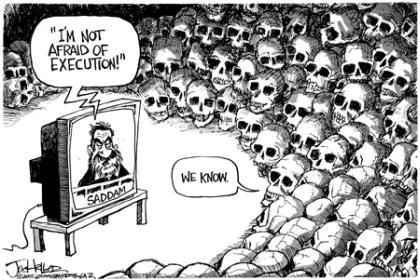
 Most baffling, though, is that the White House has been equally silent. Most baffling, though, is that the White House has been equally silent.
Had President Bush made even one mention of "Blessed July," Saddam's plans for a "wave of 'martyrdom' operations" would have dominated cable newscasts and newspaper headlines for at least a day. Maybe not dominated, but it would have garnered at least some attention.
Had the White House press office decided that the mainstream media couldn't be trusted to disseminate the information accurately, it could have at least highlighted Saddam's terror training camps for friendly columnists, talk hosts, and bloggers. It didn't.
The White House doesn't believe in re-fighting the decision to go to war, which is painfully logical. But politics isn't logical. Neither are Bush's political enemies. If the President wants people to trust that he made the right call by toppling Saddam, he needs to reiterate everyday what we know: Saddam was a threat who could no longer be tolerated.
"Blessed July" and Saddam's terror training camps would be as good a place as any to start.
 Joel Mowbray is author of Dangerous Diplomacy: How the State Department Threatens America's Security.
Front Page Magazine ~ Joel Mowbray ** Joel Mowbray is author of Dangerous Diplomacy: How the State Department Threatens America's Security.
Front Page Magazine ~ Joel Mowbray **
Saddam's Terrorist Blueprints
News like this is just too damned inconvenient for the liberal press to share. It blows away all their conspiracy theories and should take the wind out of the "Bush Lied" college campus protests.
But then what news is to be had in a non-protest?
So we march forward, secure in the knowledge that Democrats and the press will obfuscate, shield, and cover up any information which doesn't help to keep President Bush's poll numbers down.
November 2006 is going to fluster them again, isn't it?
Posted by yaahoo_2006iest
at 10:38 AM EDT
Updated: Wednesday, 10 May 2006 10:49 AM EDT
Libtard Richard Cohen Finally Discovers Left-Wing Rage and Hatred
Mood:
 spacey
Topic: Lib Loser Stories spacey
Topic: Lib Loser Stories
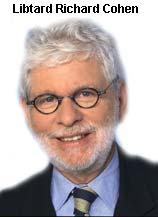 It only took this "intellectual, smarter than everyone else" libtard about five-and-a-half years to discover left-wing hatred for Bush...
Digital Lynch Mob
By Richard Cohen
Two weeks ago I wrote about Al Gore's new movie on global warming. I liked the film. In response, I instantly got more than 1,000 e-mails, most of them praising Gore, some calling him the usual names and some concluding there was no such thing as global warming, if only because Gore said there was. I put the messages aside for a slow day, when I would answer them. Then I wrote about Stephen Colbert and his unfunny performance at the White House correspondents' dinner.
 Kapow! Within a day, I got more than 2,000 e-mails. A day later, I got 1,000 more. By the fourth day, the number had reached 3,499 -- a figure that does not include the usual offers of nubile Russian women or loot from African dictators. The Colbert messages began with Patrick Manley ("You wouldn't know funny if it slapped you in the face") and ended with Ron ("Colbert ROCKS, you MURDER") who was so proud of his thought that he copied countless others. Ron, you're a genius.
Truth to tell, I peeked into only a few of the e-mails. I did this because I would sometimes recognize a name I thought I knew, which was almost always a mistake. When I guilelessly clicked on the name, I would get a bucket of raw, untreated and disease-laden verbal sewage right in the face.
 Usually, the subject line said it all. Some were friendly and agreed that Colbert had not been funny. Most, though, were in what we shall call disagreement. Fine. I said the man wasn't funny and not funny has a bullying quality to it; others (including some of my friends) said he was funny. But because I held such a view, my attentive critics were convinced I had a political agenda. I was -- as was most of the press, I found out -- George W. Bush's lap dog. If this is the case, Bush had better check his lap.
It seemed that most of my correspondents had been egged on to write me by various blogs. In response, they smartly assembled into a digital lynch mob and went roaring after me. If I did not like Colbert, I must like Bush. If I write for The Post, I must be a mainstream media warmonger. If I was over a certain age -- which I am -- I am simply out of it, wherever "it" may be. All in all, I was -- I am, and I guess I remain -- the worthy object of ignorant, false and downright idiotic vituperation.
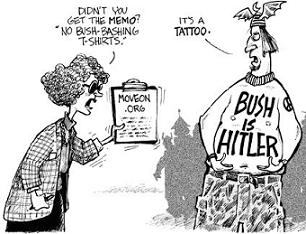 What to make of all this? First, it's not about Colbert. His show has an audience of about 1 million -- not exactly "American Idol" numbers. Second, it marks the end of a silly pretense about interactive media: We give you our e-mail addresses and then, in theory, we have this nice chat. Forget about it. Not only is e-mail too often a kind of epistolary spitball, but there's no way I can even read the 3,506 e-mails now backed up in my queue -- seven more since I started writing this column.
But the message in this case truly is the medium. The e-mails pulse in my queue, emanating raw hatred. This spells trouble -- not for Bush or, in 2008, the next GOP presidential candidate, but for Democrats. The anger festering on the Democratic left will be taken out on the Democratic middle. (Watch out, Hillary!) I have seen this anger before -- back in the Vietnam War era. That's when the antiwar wing of the Democratic Party helped elect Richard Nixon. In this way, they managed to prolong the very war they so hated.
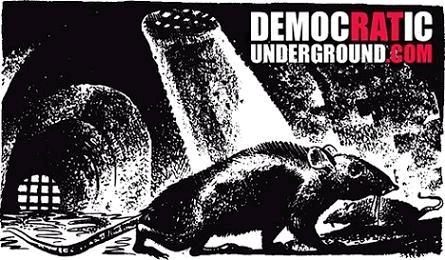
 The hatred is back. I know it's only words now appearing on my computer screen, but the words are so angry, so roiled with rage, that they are the functional equivalent of rocks once so furiously hurled during antiwar demonstrations. I can appreciate some of it. Institution after institution failed America -- the presidency, Congress and the press. They all endorsed a war to rid Iraq of what it did not have. Now, though, that gullibility is being matched by war critics who are so hyped on their own sanctimony that they will obliterate distinctions, punishing their friends for apostasy and, by so doing, aiding their enemies. If that's going to be the case, then Iraq is a war its critics will lose twice -- once because they couldn't stop it and once more at the polls. The hatred is back. I know it's only words now appearing on my computer screen, but the words are so angry, so roiled with rage, that they are the functional equivalent of rocks once so furiously hurled during antiwar demonstrations. I can appreciate some of it. Institution after institution failed America -- the presidency, Congress and the press. They all endorsed a war to rid Iraq of what it did not have. Now, though, that gullibility is being matched by war critics who are so hyped on their own sanctimony that they will obliterate distinctions, punishing their friends for apostasy and, by so doing, aiding their enemies. If that's going to be the case, then Iraq is a war its critics will lose twice -- once because they couldn't stop it and once more at the polls.
Contact Richard Cohen at cohenr@washpost.com
Washington Post ~ Richard Cohen ** Digital Lynch Mob
Austin Bay offers commentary on this topic in his article " Richard Cohen Discovers The KosKidz".
Posted by yaahoo_2006iest
at 9:26 AM EDT
Updated: Wednesday, 10 May 2006 10:11 AM EDT
Limbaugh Theory of Relativity: Mainstream Media Influence equals BS (Barbra Streisand) multiplied by Time squared
Mood:
 chatty
Now Playing: MMI=BS x T2
Topic: Funny Stuff chatty
Now Playing: MMI=BS x T2
Topic: Funny Stuff
 Limbaugh Theory of Relativity Limbaugh Theory of Relativity
 ‡
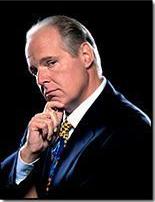 BEGIN TRANSCRIPT
RUSH: This might be an excellent time for me to explain to you my latest mathematical formula, ladies and gentlemen. I mentioned this in the previous hour. Everybody is wondering how can it be that the mainstream media, the Drive-By Media, is losing so much influence, and they are, I mean you see the newspaper circulation. We had the numbers yesterday, down, TV ratings, down, compared to all-time highs back in the eighties. There is a new media out there that consists of talk radio, Fox News, and the blogosphere. They don't have their monopoly anymore. They don't have the automatic ability in one night to shape opinion on anything. They used to have that power. They don't any longer. But despite the fact that they are losing influence, how at the same time are they able to do so much damage? This requires a formula much like Einstein had his theory of relativity, E = mc2. Because after all, admit it, this is a great question that you ask yourselves, how can this possibly be? It's the puzzle of the decade.
 How can the Drive-By Media, in such disrepute, create so much negativity? Employment is up, unemployment is down, retirement funds are up, household net worth is up, consumer confidence is up, home ownership is up, virtually every economic statistic that matters is up. How can the reality be so good and the perception be so bad? Well, much as Einstein had his theory of relativity, we here at the Limbaugh Institute have come up with our own theory of relativity for the mainstream media. Here's the formula. We'll put this on the website so you can actually see it. You can play around with it yourself. Here's the formula as expressed. MMI = BS times T squared. MMI = BS x T2. Here's what the symbols in the formula mean. MMI is mainstream media influence. We could call it DBMI, Drive-By Media influence. BS of course equals BS, Barbra Streisand. And the T, equals the time in days. So the formula is MMI = BS times time squared, T squared. Time squared.
 That is the media effect day after day, gloom. Day after day, pessimism. Day after day, housing bubble. Day after day, class warfare. Day after day, high gasoline price. Day after day, no future. Day after day, your kids inheriting a giant deficit. They'll never be able to have the life that their parents had. Then they'll run little stories in the so-called evening news, did you lose your job today? Will you lose your job tomorrow? Will your neighbor lose his job tomorrow? Did your neighbor lose his last three jobs during the Bush administration? I'm not sure who said this. "A lie told often enough becomes the truth." Was that Joseph Goebbels? [Lenin] It had to be a Nazi that did it. If there was ever a need for the Limbaugh theory of relativity, it is now, today, this time in our nation's history. The Drive-By Media influence on the economy is one thing. I mean, that's about money. But that influence, the Drive-By Media influence on the war on Islamofascism is another thing. That's about lives. That's about the future of civilization. How can vital interests, national security and so forth, be turned into doom and gloom? Easy. MMI = BS x T2. Time squared, day after day, bad news, day after day, if it bleeds, it leads. Day after day, we don't want to take sides with America because we're not sure that America deserves to win, because we're not sure that America is itself a just cause anymore.
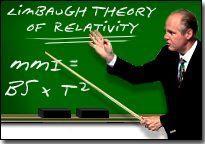 By the way, the Limbaugh Theory, my formula here works just as well with our leadership. We need a strong president to deal with the Iran problem. We need a strong president to lead a flaccid United Nations, a strong president to try to inspire a tired, worn-out Europe. So how can this president, with this economy and this domestic peace, be so low in the polls? MMI = BS x T2. The BS is everything. Everything he does is wrong, every decision he makes is wrong, every nominee he names is wrong, every time he speaks it's wrong. The Limbaugh Theory of relativity explains it all. It's not the criticism, it's not the specific items mentioned. It's the day after day after day after day after day of unceasing media attacks. I'll tell you, I have a theory also about Bush's approval numbers. This business of being at 31% now doesn't make any sense if you measure this in terms that have always been used to define presidential popularity in the past. Why, given this economy, his polls ought to at least be 50. You'd have to subtract some because people are uneasy about the war, and they're uneasy because we are fighting it in a minimalist way.

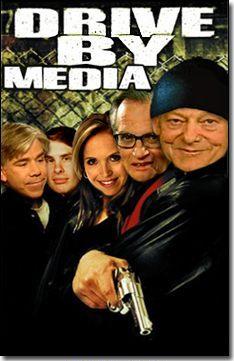 We could be done with this like we could have been done in Vietnam, much shorter period of time. We don't have the guts to do what it would take in one fell swoop to win, so we meander along. There are some other things. But the economy ought to be bringing this up, and it's not. If you look deeply in some of the most recent polls, you find that there are conservatives who are unhappy with Bush, and Republicans, which I have always maintained, and it's about agenda items. It's about conservatism that's not being implemented or even fought for, so there's that. But I also think that there's a fatigue factor. This administration has not done a whole lot to defend itself. It has left that to others, and I think there's a general fatigue among everybody. I mean, you. You probably go out and talk to people and they say, "What do you think about Bush?" You get tired of trying to explain it. We could be done with this like we could have been done in Vietnam, much shorter period of time. We don't have the guts to do what it would take in one fell swoop to win, so we meander along. There are some other things. But the economy ought to be bringing this up, and it's not. If you look deeply in some of the most recent polls, you find that there are conservatives who are unhappy with Bush, and Republicans, which I have always maintained, and it's about agenda items. It's about conservatism that's not being implemented or even fought for, so there's that. But I also think that there's a fatigue factor. This administration has not done a whole lot to defend itself. It has left that to others, and I think there's a general fatigue among everybody. I mean, you. You probably go out and talk to people and they say, "What do you think about Bush?" You get tired of trying to explain it.
Folks, I must admit, even I get tired sometimes having to defend this. They don't seem to think it's necessary. They think every news cycle has a life span that's going to end of its own and they're going to sustain it if they respond to all this. There have been some exceptions to this during the course of the past six years, but there are a number of things. In terms of this 31%, which is the new low in whatever poll, or 35 or 36, in terms of this being an accurate representation of what people in this country actually think about Bush or about the current economic circumstances, I don't think it's legitimate. I'm not saying it's being fudged in the polling. It could be some of that. We run into examples where polling companies have oversampled Democrats, for example, to achieve certain results that they want. There's something about this that just doesn't make sense in any of the ways that we have measured approval in the past. So one of two things. Either it is legitimate and there's a whole new way of measuring it that we haven't figured out or caught up to, or it's just gobbledygook and part of oddball kooky times in which we live.
END TRANSCRIPT
Read the Background Material...(NRO: Inside the President's Terrible Poll Numbers - Byron York)
*Note: Links to content outside Rush Limbaugh.com usually become inactive over time.
Rush Limbaugh.com ** Limbaugh Theory of Relativity
Posted by yaahoo_2006iest
at 8:52 AM EDT
Updated: Wednesday, 10 May 2006 8:59 AM EDT
Nineteen Libtard Demented-crats Write Book on Fighting Terrorism
Mood:
 silly
Topic: Lib Loser Stories silly
Topic: Lib Loser Stories
 LOL, It took former Virginia Gov. Mark Warner, Indiana libtard Evan Bayh, and 17 other pollsters and focus groupers to write ONE book on fighting terror...
Reclaiming Their Inner Truman
Centrist Democrats, including two of the party's leading presidential prospects, advanced a foreign policy formula today they hope will reconcile voters to a party perceived as meek and directionless on national security.
 ↓
↓
At the National Press Club, The Democratic Leadership Council's Progressive Policy Institute released a new book called "With All Our Might: A Progressive Strategy for Defeating Jihadism and Defending Liberty." The chapters knit together policy proposals that emphasize, at turns, a strong and agile military, engagement with moderate Muslim regimes, and a strong pro-democracy branding for Democrats.
"These specific arguments are not generally new," admitted Will Marshall, the PPI President. "The purpose of this book is to stop reacting to the administration and start defining what we're for." Democrats need to "use force when self respect and self defense demand it." And Democrats "must make no apologies for jihadists."
 The DLC's tough talk joins a cacophony of other voices struggling to attract the attention of Democratic leaders preparing for the contingency of party control of Congress in 2006 and for the '08 presidential race. The Center for American Progress has issued numerous white papers. The liberal American Prospect magazine devoted an issue to emerging Democratic ideas, including many on foreign policy.
Mark Warner, the former Virginia Gov. who was elected two months after 9/11, and Evan Bayh, an Indiana Democrat who has been witheringly critical of his party's dithering on foreign policy, took turns at the podium. They sounded similar themes, but they differed, often significantly, in register. [ MARC AMBINDER ]
Warner likes specifics. "The litany of mistakes are almost unprecedented," Warner said at one point, proceeding to then list the various and sundry errors he attributes to the Bush administration. Or: "We're seeing the ramifications" of [the policy]." And then he listed the ramifications.
Warner said he "gets more than a little annoyed when I hear the president's political folks like Karl Rove, say that Democrats can get caught in a pre-nine eleven mentality. Well, I was the first person elected after September 11th."
 He was cautious when describing the use of military force.
"The notion of unilateral action without consequences is the notion I believe should have [passed away] in the 20th century," he said. "Simply wielding our world's best, which we must maintain, military might, isn't going to get us there."
In contrast, Bayh endorsed "proaction" in diplomatic and military strategy. He defined that as "not sitting back in defensive crouch and waiting for" enemies to attack. Proaction allows the US to "strike them before its too late." And proaction includes "having the military capability to fight the insurgents to dry up the failed states and collapsed states where terrorists can foment those type of attacks."
 His speech drew more on the sweep of history than on the precise dynamics of the present conflict.
And as critical of his party's political dithering on foreign policy than he was of Pres. Bush's policies.
"If you ask me why we lost the last presidential election, I believe it was more than anything else it was because our perceived problems of national security broadly defined and national security, more specifically," he said.
"We're not going to be able to have a dialogue with the American people...[on education and jobs]...if they first don't trust us with those lives."
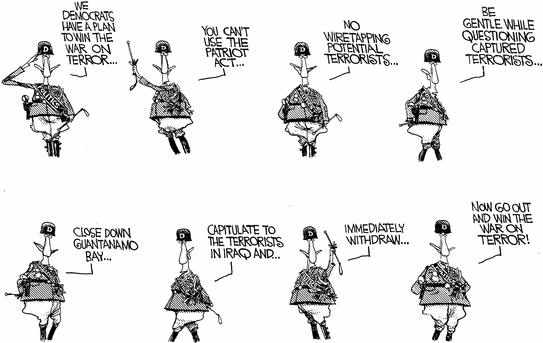
 The presence of two of the party's top presidential prospects was not lost on the organizers of the event. The DLC recognizes that the party will likely not adopt a single message until it anoints a presidential standard-bearer in late 2007 or early 2008. Warner and Bayh took turns greeting DLC chairman Al From and whispering in his ear. Both contributed blurbs to the new DLC book, although Warner noted he was identified as the "Former Governor of Virginia, Indiana." The presence of two of the party's top presidential prospects was not lost on the organizers of the event. The DLC recognizes that the party will likely not adopt a single message until it anoints a presidential standard-bearer in late 2007 or early 2008. Warner and Bayh took turns greeting DLC chairman Al From and whispering in his ear. Both contributed blurbs to the new DLC book, although Warner noted he was identified as the "Former Governor of Virginia, Indiana."
Likely opponents in the Democratic presidential primary race, Bayh and Warner are competing for media oxygen, and, by dint of their similar outlook on policy, many of the same donors. They also remain friends  .
Warner, Bayh and Sen. Hillary Clinton will headline the DLC's annual meeting in Denver this summer.
National Journal ~ Hotline ** Reclaiming Their Inner Truman
Posted by yaahoo_2006iest
at 7:27 AM EDT
Updated: Wednesday, 10 May 2006 7:33 AM EDT
Newer | Latest | Older
|
 Democratic Chairman Howard Dean Mischaracterizes His Party's Platform on Gay Rights
WASHINGTON - Democratic chairman Howard Dean mischaracterized his party's platform on gay rights in an interview courting evangelicals, then set the record straight Thursday when an advocacy group called him on it.
Dean told Christian Broadcasting Network News that the 2004 Democratic platform declares "marriage is between a man and a woman" just one of the points he made in reaching out to religious conservatives who are largely hostile to the party.
But the platform does not define marriage that way, and his remarks prompted the National Gay and Lesbian Task Force to return a $5,000 donation from the Democratic National Committee.
Dean later acknowledged his misstatement, but the group sent back the money anyway. "We need for Governor Dean to demonstrate real leadership on our issues," executive director Matt Foreman said in an interview, "not to equivocate depending on the audience."
Democratic Chairman Howard Dean Mischaracterizes His Party's Platform on Gay Rights
WASHINGTON - Democratic chairman Howard Dean mischaracterized his party's platform on gay rights in an interview courting evangelicals, then set the record straight Thursday when an advocacy group called him on it.
Dean told Christian Broadcasting Network News that the 2004 Democratic platform declares "marriage is between a man and a woman" just one of the points he made in reaching out to religious conservatives who are largely hostile to the party.
But the platform does not define marriage that way, and his remarks prompted the National Gay and Lesbian Task Force to return a $5,000 donation from the Democratic National Committee.
Dean later acknowledged his misstatement, but the group sent back the money anyway. "We need for Governor Dean to demonstrate real leadership on our issues," executive director Matt Foreman said in an interview, "not to equivocate depending on the audience."
 Dean sought to establish common ground with religious conservatives in the interview on Pat Robertson's network, a tall order considering their opposition to the Democratic Party's positions on abortion rights, gay rights and some other social issues.
Dean said that "one of the misconceptions about the Democratic Party is that we're godless and that we don't have any values."
He went on: "The truth is, we have an enormous amount in common with the Christian community, and particularly with the evangelical Christian community. And one of the biggest things that Democrats worry about is the materialism of our country, what's on television that our kids are seeing, and the lack of spirituality."
With Republicans embracing the traditional definition of marriage in 2004, Democrats sought to appeal to such traditionalists without giving up their support for gay rights.
Dean sought to establish common ground with religious conservatives in the interview on Pat Robertson's network, a tall order considering their opposition to the Democratic Party's positions on abortion rights, gay rights and some other social issues.
Dean said that "one of the misconceptions about the Democratic Party is that we're godless and that we don't have any values."
He went on: "The truth is, we have an enormous amount in common with the Christian community, and particularly with the evangelical Christian community. And one of the biggest things that Democrats worry about is the materialism of our country, what's on television that our kids are seeing, and the lack of spirituality."
With Republicans embracing the traditional definition of marriage in 2004, Democrats sought to appeal to such traditionalists without giving up their support for gay rights.
 The result: a platform plank that left the central question about what defines marriage to the states, and specifically rejected President Bush's support for a constitutional amendment to ban same-sex marriage.
It asserted: "We support full inclusion of gay and lesbian families in the life of our nation and seek equal responsibilities, benefits, and protections for these families."
Dean stated in the interview: "The Democratic Party platform from 2004 says that marriage is between a man and a woman. That's what it says."
He added that the party differs with some religious leaders in believing "everybody deserves to live with dignity and respect, and that equal rights under the law are important."
After the gay rights group went public with its complaints about his remarks, Dean acknowledged: "I misstated the Democratic Party's platform, which does not say marriage should be limited to a man and a woman," and reasserted the party's commitment to equal protection for all.
The result: a platform plank that left the central question about what defines marriage to the states, and specifically rejected President Bush's support for a constitutional amendment to ban same-sex marriage.
It asserted: "We support full inclusion of gay and lesbian families in the life of our nation and seek equal responsibilities, benefits, and protections for these families."
Dean stated in the interview: "The Democratic Party platform from 2004 says that marriage is between a man and a woman. That's what it says."
He added that the party differs with some religious leaders in believing "everybody deserves to live with dignity and respect, and that equal rights under the law are important."
After the gay rights group went public with its complaints about his remarks, Dean acknowledged: "I misstated the Democratic Party's platform, which does not say marriage should be limited to a man and a woman," and reasserted the party's commitment to equal protection for all.
 Foreman said Dean should be persuading Democrats to fight against ballot initiatives seeking to ban gay marriage, but instead has misrepresented the party's "important and affirming plank" several times.
"There has been a disturbing lack of clarity from Governor Dean about where we fit into the party and the country," he said after Dean corrected himself.
Foreman said the $5,000 was for sponsorship of the group's leadership awards dinner in Washington last week, and will be missed.
On the Net: Account of Dean interview ---- National Gay and Lesbian Task Force
ABC News ~ Associated Press - Calvin Woodward ** Dean Misstates Party Platform on Gays
Foreman said Dean should be persuading Democrats to fight against ballot initiatives seeking to ban gay marriage, but instead has misrepresented the party's "important and affirming plank" several times.
"There has been a disturbing lack of clarity from Governor Dean about where we fit into the party and the country," he said after Dean corrected himself.
Foreman said the $5,000 was for sponsorship of the group's leadership awards dinner in Washington last week, and will be missed.
On the Net: Account of Dean interview ---- National Gay and Lesbian Task Force
ABC News ~ Associated Press - Calvin Woodward ** Dean Misstates Party Platform on Gays

 LOS ANGELES - A wheelchair-bound Los Angeles woman, who has repeatedly filed lawsuits over access for the disabled, got up and ran after police arrested her for fraud, authorities said on Thursday.
Laura Lee Medley, 35, had sued in at least four California cities over injuries she claimed she sustained while trying to navigate her wheelchair before she was suspected of fraud.
Medley, who claimed to be paralyzed from a drunk driving accident, was tracked to Las Vegas where police there took her into custody and then, when she complained of medical issues, to a local hospital, Long Beach prosecutor Belinda Mayes said.
LOS ANGELES - A wheelchair-bound Los Angeles woman, who has repeatedly filed lawsuits over access for the disabled, got up and ran after police arrested her for fraud, authorities said on Thursday.
Laura Lee Medley, 35, had sued in at least four California cities over injuries she claimed she sustained while trying to navigate her wheelchair before she was suspected of fraud.
Medley, who claimed to be paralyzed from a drunk driving accident, was tracked to Las Vegas where police there took her into custody and then, when she complained of medical issues, to a local hospital, Long Beach prosecutor Belinda Mayes said.
 "She gets to the hospital and while she's waiting for an examination, she gets up from the chair and runs," Mayes said. "Somebody remarked, 'That's where the great miracle occurred."'
Medley sprinted through the hospital corridors but was quickly apprehended by police and booked pending extradition to San Bernardino, southern California, where she is facing charges of filing false documents, attempted grand theft and insurance fraud.
Medley has sued the cities of Long Beach and South Pasadena and counties of San Bernardino and Riverside over various injuries she claimed she sustained in her wheelchair. She was also being sought on arrest warrants by the states of Oregon and Washington, Mayes said.
"She gets to the hospital and while she's waiting for an examination, she gets up from the chair and runs," Mayes said. "Somebody remarked, 'That's where the great miracle occurred."'
Medley sprinted through the hospital corridors but was quickly apprehended by police and booked pending extradition to San Bernardino, southern California, where she is facing charges of filing false documents, attempted grand theft and insurance fraud.
Medley has sued the cities of Long Beach and South Pasadena and counties of San Bernardino and Riverside over various injuries she claimed she sustained in her wheelchair. She was also being sought on arrest warrants by the states of Oregon and Washington, Mayes said.


 CALLER: Did he say something about discrimination?
RUSH: "Millions of Americans will be at risk of losing their day in court when they suffer the yolk of discrimination." I don't think -- not racists -- he's calling us bigots overall. Women are going to lose their rights. Humans are going to lose their rights. Workers are going to lose their rights. Animals are going to lose their rights. Everybody is going to lose their rights. We're going to die. We're all going to be shipped down to Club Gitmo and that's it. We're dead; we're all going to be imprisoned.
CALLER: This is why we can't come together as a country. I mean, do you hear Republicans saying anything like this? I mean, I'm sure there's a friend or two, there's a Pat Robertson, but for the most part you don't hear people being incendiary about Democrats on the Republican side.
RUSH: Well, you know you mentioned Pat Robertson. Look, Pat Robertson can say whatever he wants and it will be news for two days about what a kook he is, and they'll go talk to Republicans, "Don't you think you should distance yourself from this man? Don't you think this man should shut up?
CALLER: Did he say something about discrimination?
RUSH: "Millions of Americans will be at risk of losing their day in court when they suffer the yolk of discrimination." I don't think -- not racists -- he's calling us bigots overall. Women are going to lose their rights. Humans are going to lose their rights. Workers are going to lose their rights. Animals are going to lose their rights. Everybody is going to lose their rights. We're going to die. We're all going to be shipped down to Club Gitmo and that's it. We're dead; we're all going to be imprisoned.
CALLER: This is why we can't come together as a country. I mean, do you hear Republicans saying anything like this? I mean, I'm sure there's a friend or two, there's a Pat Robertson, but for the most part you don't hear people being incendiary about Democrats on the Republican side.
RUSH: Well, you know you mentioned Pat Robertson. Look, Pat Robertson can say whatever he wants and it will be news for two days about what a kook he is, and they'll go talk to Republicans, "Don't you think you should distance yourself from this man? Don't you think this man should shut up? Don't you think this man is embarrassing?" Harry Belafonte comes out, calls Bush a terrorist, worse than Hitler, blah, blah, blah, says that the Patriot Act is the equivalent of Nazism or whatever he said, he gets two days of serious analysis on CNN and the other cable channels. So it is what it is. Chuck Schumer is just a fading liberal who realizes he's in the minority. I think if you want to talk about racism, listen to Ted Kennedy here. We played this bite earlier, but this is old Ted, and he's screaming on the floor of the Senate yesterday, before the cloture vote.
KENNEDY: Our Founding Fathers failed the test when they wrote slavery into the Constitution. Abraham Lincoln pointed the way, and we passed the 13th, 14th, Fifteenth Amendment and had the Civil War but we didn't resolve this issue. It was only 'til we had the courage of those members of what branch of government? Not the United States Congress, not the United States Senate, not the executive, the judiciary, the Fifth Circuit. We're talking now about the Supreme Court! But they are the ones that changed this country inevitably with what we call the march toward progress.
Don't you think this man is embarrassing?" Harry Belafonte comes out, calls Bush a terrorist, worse than Hitler, blah, blah, blah, says that the Patriot Act is the equivalent of Nazism or whatever he said, he gets two days of serious analysis on CNN and the other cable channels. So it is what it is. Chuck Schumer is just a fading liberal who realizes he's in the minority. I think if you want to talk about racism, listen to Ted Kennedy here. We played this bite earlier, but this is old Ted, and he's screaming on the floor of the Senate yesterday, before the cloture vote.
KENNEDY: Our Founding Fathers failed the test when they wrote slavery into the Constitution. Abraham Lincoln pointed the way, and we passed the 13th, 14th, Fifteenth Amendment and had the Civil War but we didn't resolve this issue. It was only 'til we had the courage of those members of what branch of government? Not the United States Congress, not the United States Senate, not the executive, the judiciary, the Fifth Circuit. We're talking now about the Supreme Court! But they are the ones that changed this country inevitably with what we call the march toward progress.
 RUSH: So here's Senator Kennedy again admitting what the court represents to liberals. It's the way to get what they believe enacted as law since they can't pass those laws democratically in legislative bodies. But Senator Kennedy leaves out something very important here, and it's this, ladies and gentlemen. The only reason that civil rights had to go to the courts was because of Democrats back in the fifties and sixties in that very same precious Senate of which Senator Kennedy is a member. They filibustered civil rights back in the sixties. They filibustered against civil rights legislation. Democrat governors stood in schoolhouse doors to disobey the executive branch. Democrat chiefs of police like Bull Connor turned fire hoses loose. Democrats were beating up congressman John Lewis back when he was marching with Dr. Martin Luther King. It was the Democrats back then who were standing in the way of the passage of civil rights, which is why it had to go to the courts.
RUSH: So here's Senator Kennedy again admitting what the court represents to liberals. It's the way to get what they believe enacted as law since they can't pass those laws democratically in legislative bodies. But Senator Kennedy leaves out something very important here, and it's this, ladies and gentlemen. The only reason that civil rights had to go to the courts was because of Democrats back in the fifties and sixties in that very same precious Senate of which Senator Kennedy is a member. They filibustered civil rights back in the sixties. They filibustered against civil rights legislation. Democrat governors stood in schoolhouse doors to disobey the executive branch. Democrat chiefs of police like Bull Connor turned fire hoses loose. Democrats were beating up congressman John Lewis back when he was marching with Dr. Martin Luther King. It was the Democrats back then who were standing in the way of the passage of civil rights, which is why it had to go to the courts.
 Senator Kennedy conveniently leaves that out, because the modern mantra is that it's Republicans who were racists. It was Republicans who don't want civil rights. It was Republicans who stood in the way of the Civil Rights Act. A greater percentage of Republican senators voted for the Civil Rights Act than did Democrats. Bill Clinton's icon, his mentor, J. William Fulbright, led one of the Senate measures to oppose civil rights. Big segregationist. All these southern Democrats were huge segregationists, and that's why it had to go to the courts, because the legislatures, the Congress and the Senate back then, run by Democrats, were the obstacle to civil rights. That's history.
Senator Kennedy conveniently leaves that out, because the modern mantra is that it's Republicans who were racists. It was Republicans who don't want civil rights. It was Republicans who stood in the way of the Civil Rights Act. A greater percentage of Republican senators voted for the Civil Rights Act than did Democrats. Bill Clinton's icon, his mentor, J. William Fulbright, led one of the Senate measures to oppose civil rights. Big segregationist. All these southern Democrats were huge segregationists, and that's why it had to go to the courts, because the legislatures, the Congress and the Senate back then, run by Democrats, were the obstacle to civil rights. That's history.
 BREAK TRANSCRIPT
RUSH: You know, Coretta Scott King died today. And there's all this coverage. I mean, I'm not critical of the coverage, but I just think it's ironic. I just think it's as hypocritical as can be because here's Coretta Scott King being lionized and deified practically today, but none, zilch, zero, nada of the reporting is mentioning who it was that wiretapped her husband, the Reverend Martin Luther King, Jr., for the purposes of destroying his marriage. It was good old Bobby Kennedy. Party? Democrat. Year? Sixties. Same year that Democrats in the Senate are fighting the Civil Rights Act.
BREAK TRANSCRIPT
RUSH: You know, Coretta Scott King died today. And there's all this coverage. I mean, I'm not critical of the coverage, but I just think it's ironic. I just think it's as hypocritical as can be because here's Coretta Scott King being lionized and deified practically today, but none, zilch, zero, nada of the reporting is mentioning who it was that wiretapped her husband, the Reverend Martin Luther King, Jr., for the purposes of destroying his marriage. It was good old Bobby Kennedy. Party? Democrat. Year? Sixties. Same year that Democrats in the Senate are fighting the Civil Rights Act.
 So they're wiretapping Martin Luther King. They were spying, domestic spying, Bobby Kennedy, because the rumors were that Martin Luther King had mistresses all over the place and they wanted to find them, and they wanted to discredit Martin Luther King. The Kennedy administration, for the purposes of making it all public and destroying his marriage. Today, they lionize Coretta Scott King but leave out an interesting, I'd say 75%, of the story.
END TRANSCRIPT
So they're wiretapping Martin Luther King. They were spying, domestic spying, Bobby Kennedy, because the rumors were that Martin Luther King had mistresses all over the place and they wanted to find them, and they wanted to discredit Martin Luther King. The Kennedy administration, for the purposes of making it all public and destroying his marriage. Today, they lionize Coretta Scott King but leave out an interesting, I'd say 75%, of the story.
END TRANSCRIPT
 Read the Background Material...
Read the Background Material... Study: Rush Limbaugh Dominates Talk Radio
Talk-show host Rush Limbaugh still dominates the radio talk show business, a new study finds.
According to a recently released survey by the Benchmark Company, Limbaugh was "the most widely identified radio talk-show host" in America - with some 94 percent of Americans indicating they know who he is.
Satellite radio shock jock Howard Stern was a close second, with 89 percent of Americans saying they could identify him.
Study: Rush Limbaugh Dominates Talk Radio
Talk-show host Rush Limbaugh still dominates the radio talk show business, a new study finds.
According to a recently released survey by the Benchmark Company, Limbaugh was "the most widely identified radio talk-show host" in America - with some 94 percent of Americans indicating they know who he is.
Satellite radio shock jock Howard Stern was a close second, with 89 percent of Americans saying they could identify him.
 But the Benchmark study also noted a general decline in the ability of regular talk radio listeners to identify other nationally syndicated hosts.
"With the exception of a few, well-established icons like Limbaugh and Stern, it may well be that the number of nationally syndicated radio hosts has gone past the point where the average listener can absorb all the names," said Dr. Rob Balon, CEO of Benchmark.
The study of 1120 regular listeners of AM and FM talk radio was the third installment in the Benchmark series on talk radio that began in 1994.
In addition, the study found that there were more listeners who classified themselves as political moderates and fewer who identified themselves as conservatives.
But the Benchmark study also noted a general decline in the ability of regular talk radio listeners to identify other nationally syndicated hosts.
"With the exception of a few, well-established icons like Limbaugh and Stern, it may well be that the number of nationally syndicated radio hosts has gone past the point where the average listener can absorb all the names," said Dr. Rob Balon, CEO of Benchmark.
The study of 1120 regular listeners of AM and FM talk radio was the third installment in the Benchmark series on talk radio that began in 1994.
In addition, the study found that there were more listeners who classified themselves as political moderates and fewer who identified themselves as conservatives.
 Another surprising finding was the perceived importance of local radio talk hosts. Sixty-nine percent of respondents mentioned a local host when asked who their favorite radio personality was.
"Local hosts talk about things that impact folks on their own turf," explained Balon. "Sometimes it is politics, sometimes water cooler stuff, but it is what the listener relates to."
The study also addressed the role of the Internet and of technology in talk radio. 49 percent of respondents said they'd consider a monthly subscription if their favorite host went to a satellite station. And 65 percent mentioned visiting their favorite talk station's Web site while 19 percent said they at least occasionally listened online.
Another surprising finding was the perceived importance of local radio talk hosts. Sixty-nine percent of respondents mentioned a local host when asked who their favorite radio personality was.
"Local hosts talk about things that impact folks on their own turf," explained Balon. "Sometimes it is politics, sometimes water cooler stuff, but it is what the listener relates to."
The study also addressed the role of the Internet and of technology in talk radio. 49 percent of respondents said they'd consider a monthly subscription if their favorite host went to a satellite station. And 65 percent mentioned visiting their favorite talk station's Web site while 19 percent said they at least occasionally listened online.
 An international surveillance network established by the National Security Agency and British intelligence services has come under scrutiny in recent weeks, as lawmakers in the United States question whether the network, known as Echelon, could be used to monitor American citizens.
Last week, the House Committee on Intelligence requested that the
An international surveillance network established by the National Security Agency and British intelligence services has come under scrutiny in recent weeks, as lawmakers in the United States question whether the network, known as Echelon, could be used to monitor American citizens.
Last week, the House Committee on Intelligence requested that the  Although Echelon was originally set up as an international spy network, lawmakers are concerned that it could be used to eavesdrop on American citizens.
"I am concerned there are not sufficient legal mechanisms in place to protect our private information from unauthorized government eavesdropping through such mechanisms as Project Echelon," Barr said in an interview on Tuesday.
The finished report will outline the legal bases and other criteria used by United States intelligence agencies when assessing potential wiretap targets. It will be submitted to the House and made available to the public.
"If the agencies feel unable to provide a full account to the public, then a second classified report will be provided to the House Committee on Intelligence," Barr said. "This is to stop the agencies hiding behind a cloak of secrecy."
Although Echelon was originally set up as an international spy network, lawmakers are concerned that it could be used to eavesdrop on American citizens.
"I am concerned there are not sufficient legal mechanisms in place to protect our private information from unauthorized government eavesdropping through such mechanisms as Project Echelon," Barr said in an interview on Tuesday.
The finished report will outline the legal bases and other criteria used by United States intelligence agencies when assessing potential wiretap targets. It will be submitted to the House and made available to the public.
"If the agencies feel unable to provide a full account to the public, then a second classified report will be provided to the House Committee on Intelligence," Barr said. "This is to stop the agencies hiding behind a cloak of secrecy."
 Judith Emmel, chief of public affairs for the NSA, declined to comment about the UKUSA Agreement but said the agency was committed to responding to all information requests covered by Barr's amendment. "The NSA's Office of General Counsel works hard to ensure that all Agency activities are conducted in accordance with the highest constitutional, legal and ethical standards," she said.
Until last Sunday, no government or intelligence agency from the member states had openly admitted to the existence of the UKUSA Agreement or Echelon. However, on a television program broadcast on Sunday in Australia, the director of Australia's Defence Signals Directorate acknowledged the existence of the agreement. The official, Martin Brady, declined to be interviewed for the "
Judith Emmel, chief of public affairs for the NSA, declined to comment about the UKUSA Agreement but said the agency was committed to responding to all information requests covered by Barr's amendment. "The NSA's Office of General Counsel works hard to ensure that all Agency activities are conducted in accordance with the highest constitutional, legal and ethical standards," she said.
Until last Sunday, no government or intelligence agency from the member states had openly admitted to the existence of the UKUSA Agreement or Echelon. However, on a television program broadcast on Sunday in Australia, the director of Australia's Defence Signals Directorate acknowledged the existence of the agreement. The official, Martin Brady, declined to be interviewed for the " .
Meanwhile,
.
Meanwhile,  According to the report, Echelon is just one of the many code names for the monitoring system, which consists of satellite interception stations in participating countries. The stations collectively monitor millions of voice and data messages each day. These messages are then scanned and checked against certain key criteria held in a computer system called the "Dictionary." In the case of voice communications, the criteria could include a suspected criminal's telephone number; with respect to data communications, the messages might be scanned for certain keywords, like "bomb" or "drugs." The report also alleges that Echelon is capable of monitoring terrestrial Internet traffic through interception nodes placed on deep-sea communications cables.
While few dispute the necessity of a system like Echelon to apprehend foreign spies, drug traffickers and terrorists, many are concerned that the system could be abused to collect economic and political information.
"The recent revelations about China's spying activities in the U.S. demonstrates that there is a clear need for electronic monitoring capabilities," said Patrick Poole, a lecturer in government and economics at Bannock Burn College in Franklin, Tenn., who compiled a
According to the report, Echelon is just one of the many code names for the monitoring system, which consists of satellite interception stations in participating countries. The stations collectively monitor millions of voice and data messages each day. These messages are then scanned and checked against certain key criteria held in a computer system called the "Dictionary." In the case of voice communications, the criteria could include a suspected criminal's telephone number; with respect to data communications, the messages might be scanned for certain keywords, like "bomb" or "drugs." The report also alleges that Echelon is capable of monitoring terrestrial Internet traffic through interception nodes placed on deep-sea communications cables.
While few dispute the necessity of a system like Echelon to apprehend foreign spies, drug traffickers and terrorists, many are concerned that the system could be abused to collect economic and political information.
"The recent revelations about China's spying activities in the U.S. demonstrates that there is a clear need for electronic monitoring capabilities," said Patrick Poole, a lecturer in government and economics at Bannock Burn College in Franklin, Tenn., who compiled a  On the "Sunday Program" special on Echelon, Mike Frost, a former employee of Canada's Communications Security Establishment, said that Britain's intelligence agency requested that the CSE monitor the communications of British government officials in the late 1980s. Under British law, the intelligence agency is prohibited from monitoring its own government. Frost also said that since the cold war is over, the "the focus now is towards economic intelligence."
Still, Echelon has been shrouded in such secrecy that its very existence has been difficult to prove. Barr's amendment aims to change that.
"If this report reveals that information about American citizens is being collected without legal authorization, the intelligence community will have some serious explaining to do," Barr said.
On the "Sunday Program" special on Echelon, Mike Frost, a former employee of Canada's Communications Security Establishment, said that Britain's intelligence agency requested that the CSE monitor the communications of British government officials in the late 1980s. Under British law, the intelligence agency is prohibited from monitoring its own government. Frost also said that since the cold war is over, the "the focus now is towards economic intelligence."
Still, Echelon has been shrouded in such secrecy that its very existence has been difficult to prove. Barr's amendment aims to change that.
"If this report reveals that information about American citizens is being collected without legal authorization, the intelligence community will have some serious explaining to do," Barr said.
 FDR's Domestic Surveillance
In a bold and controversial decision, the president authorized a program for the surveillance of communications within the United States, seeking to prevent acts of domestic sabotage and espionage. In so doing, he ignored a statute that possibly forbade such activity, even though high-profile federal judges had affirmed the statute's validity. The president sought statutory amendments allowing this surveillance but, when no such legislation was forthcoming, he continued the program nonetheless. And when Congress demanded that he disclose details of the surveillance program, the attorney general said, in no uncertain terms, that it would get nothing of the sort.
In short, President Franklin Delano Roosevelt charted a bold course in defending the nation's security in 1940, when he did all of these things.
It is worth remembering FDR's example as the debate over the NSA's warrantless surveillance continues to heat up. After a few months' lull, it seems that the issue is again creeping into the headlines. On April 27, for example, Senate Judiciary Committee Chairman Arlen Specter
FDR's Domestic Surveillance
In a bold and controversial decision, the president authorized a program for the surveillance of communications within the United States, seeking to prevent acts of domestic sabotage and espionage. In so doing, he ignored a statute that possibly forbade such activity, even though high-profile federal judges had affirmed the statute's validity. The president sought statutory amendments allowing this surveillance but, when no such legislation was forthcoming, he continued the program nonetheless. And when Congress demanded that he disclose details of the surveillance program, the attorney general said, in no uncertain terms, that it would get nothing of the sort.
In short, President Franklin Delano Roosevelt charted a bold course in defending the nation's security in 1940, when he did all of these things.
It is worth remembering FDR's example as the debate over the NSA's warrantless surveillance continues to heat up. After a few months' lull, it seems that the issue is again creeping into the headlines. On April 27, for example, Senate Judiciary Committee Chairman Arlen Specter  As with so many issues central to the global war on terror in which the need for security must be balanced against individual liberties, there is no fool-proof answer to the questions raised by the NSA's surveillance program. Yet broad sections of the left have personalized this debate around President Bush. Their hatred and distrust of Bush drives them to see the administration's actions in the worst light possible. To that extent, it's important to understand how President Roosevelt -- a paragon of the left -- dealt with similar problems.
President Bush faces challenges on two fronts. First, it's been argued that there is no authority for the NSA surveillance, either statutory or constitutional. Second, congressional critics demand that the administration disclose the details of the surveillance program. The Roosevelt administration faced similar challenges in the days leading up to World War II. Documents that we obtained from Justice Robert Jackson's archives at the Library of Congress, some of which have never before been discussed in the press, show that President Roosevelt did not doubt his authority to conduct such surveillance in the interest of national security.
As with so many issues central to the global war on terror in which the need for security must be balanced against individual liberties, there is no fool-proof answer to the questions raised by the NSA's surveillance program. Yet broad sections of the left have personalized this debate around President Bush. Their hatred and distrust of Bush drives them to see the administration's actions in the worst light possible. To that extent, it's important to understand how President Roosevelt -- a paragon of the left -- dealt with similar problems.
President Bush faces challenges on two fronts. First, it's been argued that there is no authority for the NSA surveillance, either statutory or constitutional. Second, congressional critics demand that the administration disclose the details of the surveillance program. The Roosevelt administration faced similar challenges in the days leading up to World War II. Documents that we obtained from Justice Robert Jackson's archives at the Library of Congress, some of which have never before been discussed in the press, show that President Roosevelt did not doubt his authority to conduct such surveillance in the interest of national security.
 In 1937 and 1939, the Supreme Court handed down a pair of decisions in the matter of Nardone v. United States. The Court held that the Communications Act of 1934 barred federal surveillance of telephone lines, and that evidence obtained from such surveillance couldn't be introduced at trial.
In response, Attorney General (and future Supreme Court justice) Robert Jackson ended the FBI's longstanding surveillance of suspected saboteurs and spies. FBI director J. Edgar Hoover protested this decision. In an April 13, 1940 memorandum to Jackson, Hoover outlined a number of pending investigations that were hampered by Jackson's decision. Hoover concluded, "Frankly, the Bureau cannot cope with this problem without the use of wire taps and I feel obligated to bring this situation to your attention at the present time rather than to wait until a national catastrophe focuses the spotlight of public indignation upon the Department because of its failure to prevent a serious occurrence."
President Roosevelt sided with Hoover, not Jackson. In a signed May 21, 1940 memorandum to his attorney general, FDR wrote:
In 1937 and 1939, the Supreme Court handed down a pair of decisions in the matter of Nardone v. United States. The Court held that the Communications Act of 1934 barred federal surveillance of telephone lines, and that evidence obtained from such surveillance couldn't be introduced at trial.
In response, Attorney General (and future Supreme Court justice) Robert Jackson ended the FBI's longstanding surveillance of suspected saboteurs and spies. FBI director J. Edgar Hoover protested this decision. In an April 13, 1940 memorandum to Jackson, Hoover outlined a number of pending investigations that were hampered by Jackson's decision. Hoover concluded, "Frankly, the Bureau cannot cope with this problem without the use of wire taps and I feel obligated to bring this situation to your attention at the present time rather than to wait until a national catastrophe focuses the spotlight of public indignation upon the Department because of its failure to prevent a serious occurrence."
President Roosevelt sided with Hoover, not Jackson. In a signed May 21, 1940 memorandum to his attorney general, FDR wrote:
 FDR's assertion that the Supreme Court didn't read the Communications Act to bar surveillance for national defense wasn't based on the statute's text. The Communications Act provided that "no person not being authorized by the sender shall intercept any communication and divulge or publish the existence, contents, substance, purport, effect, or meaning of such intercepted communication to any person." The only source for FDR's national-security exception was the same as the one now presented as a defense of the NSA surveillance program: the president's inherent constitutional authority, as commander in chief of the armed forces, to conduct surveillance as an incident to the military's defense of our nation.
FDR's assertion that the Supreme Court didn't read the Communications Act to bar surveillance for national defense wasn't based on the statute's text. The Communications Act provided that "no person not being authorized by the sender shall intercept any communication and divulge or publish the existence, contents, substance, purport, effect, or meaning of such intercepted communication to any person." The only source for FDR's national-security exception was the same as the one now presented as a defense of the NSA surveillance program: the president's inherent constitutional authority, as commander in chief of the armed forces, to conduct surveillance as an incident to the military's defense of our nation.
 Despite FDR's readiness to use his inherent authority, he and Jackson pushed Congress to give the administration statutory authority. As Jackson recounted in his memoir, the administration sought authorization for surveillance for not only "espionage [and] sabotage," but also "extortion and kidnapping cases." The House was willing only to authorize FBI wiretapping "in the interest of national defense." As today, any such legislation was opposed by the ACLU, as well as (in Jackson's words) "others of liberal persuasion."
FDR and Jackson also opposed those who sought to require that surveillance be approved not only by the attorney general but also by the courts, through warrant requirements. As Jackson wrote in a March 19, 1941 letter to Rep. Hatton Summers, "I do not favor the search warrant procedure.... Such procedure means loss of precious time, probably publicity, and filing of charges against persons as a basis for wire tapping before investigation is complete which might easily result in great injury to such persons."
Despite FDR's readiness to use his inherent authority, he and Jackson pushed Congress to give the administration statutory authority. As Jackson recounted in his memoir, the administration sought authorization for surveillance for not only "espionage [and] sabotage," but also "extortion and kidnapping cases." The House was willing only to authorize FBI wiretapping "in the interest of national defense." As today, any such legislation was opposed by the ACLU, as well as (in Jackson's words) "others of liberal persuasion."
FDR and Jackson also opposed those who sought to require that surveillance be approved not only by the attorney general but also by the courts, through warrant requirements. As Jackson wrote in a March 19, 1941 letter to Rep. Hatton Summers, "I do not favor the search warrant procedure.... Such procedure means loss of precious time, probably publicity, and filing of charges against persons as a basis for wire tapping before investigation is complete which might easily result in great injury to such persons."
 In the end, FDR and the Congress weren't able to agree on a legislative compromise. Nonetheless, President Roosevelt continued to authorize national-security surveillance. All of this predated America's entry into the Second World War.
After choosing to authorize surveillance, President Roosevelt faced angry legislators (similar to Senator Specter and others today) who called for disclosure of the surveillance program's details in order to inform the legislative debate. FDR decided that Congress was not entitled to, and could not be trusted with, such information. He thus refused to comply.
In the end, FDR and the Congress weren't able to agree on a legislative compromise. Nonetheless, President Roosevelt continued to authorize national-security surveillance. All of this predated America's entry into the Second World War.
After choosing to authorize surveillance, President Roosevelt faced angry legislators (similar to Senator Specter and others today) who called for disclosure of the surveillance program's details in order to inform the legislative debate. FDR decided that Congress was not entitled to, and could not be trusted with, such information. He thus refused to comply.
 Attorney General Jackson spelled this out in an April 30, 1941 letter to Rep. Carl Vinson, Chairman of the House Committee on Naval Affairs. Jackson reviewed the history of presidential refusals to disclose national security information, beginning with President Washington's 1796 refusal to disclose the details of treaty negotiations. Jackson warned that to provide such information to Congress would enable congressional personnel to leak details to the public, thereby tipping off targets and embarrassing informants. He said that disclosure would "prejudice the national defense and be of aid and comfort to the very subversive elements against which you wish to protect the country." And despite the fact that Congress was attempting to pass legislation pertaining to that very program, Jackson concluded that information regarding the surveillance "can be of little, if any, value in connection with the framing of legislation or the performance of any other constitutional duty of the Congress."
Jackson recognized that the president and Congress face different responsibilities, making agreement between the two branches difficult on such weighty, heated, time-sensitive issues. The Constitution gives the president the responsibility to act quickly and decisively to defend the national security. Congress, freed from such responsibility, could indulge other preoccupations. At one point, Jackson wrote Rep. John Coffee that "I am confident that if you and any of the other liberals in Congress sat in my seat and were held to some degree of responsibility for the perpetration of acts of sabotage and espionage in this country you would feel differently about the wire tapping bill."
Attorney General Jackson spelled this out in an April 30, 1941 letter to Rep. Carl Vinson, Chairman of the House Committee on Naval Affairs. Jackson reviewed the history of presidential refusals to disclose national security information, beginning with President Washington's 1796 refusal to disclose the details of treaty negotiations. Jackson warned that to provide such information to Congress would enable congressional personnel to leak details to the public, thereby tipping off targets and embarrassing informants. He said that disclosure would "prejudice the national defense and be of aid and comfort to the very subversive elements against which you wish to protect the country." And despite the fact that Congress was attempting to pass legislation pertaining to that very program, Jackson concluded that information regarding the surveillance "can be of little, if any, value in connection with the framing of legislation or the performance of any other constitutional duty of the Congress."
Jackson recognized that the president and Congress face different responsibilities, making agreement between the two branches difficult on such weighty, heated, time-sensitive issues. The Constitution gives the president the responsibility to act quickly and decisively to defend the national security. Congress, freed from such responsibility, could indulge other preoccupations. At one point, Jackson wrote Rep. John Coffee that "I am confident that if you and any of the other liberals in Congress sat in my seat and were held to some degree of responsibility for the perpetration of acts of sabotage and espionage in this country you would feel differently about the wire tapping bill."
 And so it goes today. In the coming weeks, Senator Specter and others may threaten to withhold funds from the NSA or block nominations (such as General Hayden's nomination to head the CIA). The prerogatives of spending cuts and nominations blocks are within the power of the Congress, just as defense of the national security is committed to the president. President Bush can only hope that cooler heads prevail among House and Senate majorities. But in pursuing his own course of action, President Bush should keep in mind -- and cite as justification -- the example of the opposition party's greatest hero, President Roosevelt.
Adam White's review of Justice Robert Jackson's draft opinions in the famous Korean War-era Steel Seizure Cases will appear in the Albany Law Review later this year; his defense of the Senate's power to filibuster judicial nominations appeared last year in the Harvard Journal of Law & Public Policy. Daveed Gartenstein-Ross is an attorney and counterterrorism consultant. His first book, My Year Inside Radical Islam, will be published in winter 2007 by Tarcher/Penguin.
And so it goes today. In the coming weeks, Senator Specter and others may threaten to withhold funds from the NSA or block nominations (such as General Hayden's nomination to head the CIA). The prerogatives of spending cuts and nominations blocks are within the power of the Congress, just as defense of the national security is committed to the president. President Bush can only hope that cooler heads prevail among House and Senate majorities. But in pursuing his own course of action, President Bush should keep in mind -- and cite as justification -- the example of the opposition party's greatest hero, President Roosevelt.
Adam White's review of Justice Robert Jackson's draft opinions in the famous Korean War-era Steel Seizure Cases will appear in the Albany Law Review later this year; his defense of the Senate's power to filibuster judicial nominations appeared last year in the Harvard Journal of Law & Public Policy. Daveed Gartenstein-Ross is an attorney and counterterrorism consultant. His first book, My Year Inside Radical Islam, will be published in winter 2007 by Tarcher/Penguin. Saddam's Terrorist Blueprints
By
Saddam's Terrorist Blueprints
By  ↓
↓ According to a Nexis search, only four news outlets have even mentioned "Blessed July," which was, in the words of the Foreign Affairs article, "a regime-directed wave of 'martyrdom' operations against targets in the West." All nine articles were editorials or opinion pieces. The New York Times essentially avoided covering the report or the magazine summary of it, as the paper instead excerpted a book co-authored by one of its reporters that relied heavily on the report. Even the Associated Press declined to print a quick mention that preparations for "Blessed July," again quoting from the magazine article, "were well under way at the time of the coalition invasion."
The Washington Post, however, did cover the release of the Foreign Affairs article, but with this headline: "U.S. Said To Misread Hussein On Arms." The not-so-subtle implication of the rather brief story was that Saddam didn't pose as big a threat as we thought. In the weeks following the Post article, the full report was released and its authors appeared before Congress. Neither event triggered additional coverage.
According to a Nexis search, only four news outlets have even mentioned "Blessed July," which was, in the words of the Foreign Affairs article, "a regime-directed wave of 'martyrdom' operations against targets in the West." All nine articles were editorials or opinion pieces. The New York Times essentially avoided covering the report or the magazine summary of it, as the paper instead excerpted a book co-authored by one of its reporters that relied heavily on the report. Even the Associated Press declined to print a quick mention that preparations for "Blessed July," again quoting from the magazine article, "were well under way at the time of the coalition invasion."
The Washington Post, however, did cover the release of the Foreign Affairs article, but with this headline: "U.S. Said To Misread Hussein On Arms." The not-so-subtle implication of the rather brief story was that Saddam didn't pose as big a threat as we thought. In the weeks following the Post article, the full report was released and its authors appeared before Congress. Neither event triggered additional coverage.
 Even if Post reporters missed the section in the 230-page report on terror training camps operated by the Fedayeen Saddam, the militia of soldiers most loyal to the ruthless ruler, that issue was raised again in Congressional hearings last month. The camps, which were started in 1994, trained some 7,200 Iraqis in the art of terrorism in the first year alone. "Beginning in 1998," according to the full report, "these camps began hosting 'Arab volunteers from Egypt, Palestine, Jordan, 'the Gulf,' and Syria.'"
So in the late 1990's and beyond, during which time conventional wisdom tells us that Saddam was "contained," Iraq was training thousands of terrorists from across the Arab world. Saddam was not slowing down. "The training activity of the groups were increasing both internal and apparently external. It was increasing over time," testified Lt. Col. Kevin Woods (retired), the report's chief author.
Many Democrats, leading leftists, and even ostensibly objective members of the Fourth Estate scoff at Bush's contention that the war in Iraq was a necessary component of the war on terror. Yet when fairly compelling proof emerges that Saddam was actively involved in both training terrorists and planning attacks, the collective response was silence.
Even if Post reporters missed the section in the 230-page report on terror training camps operated by the Fedayeen Saddam, the militia of soldiers most loyal to the ruthless ruler, that issue was raised again in Congressional hearings last month. The camps, which were started in 1994, trained some 7,200 Iraqis in the art of terrorism in the first year alone. "Beginning in 1998," according to the full report, "these camps began hosting 'Arab volunteers from Egypt, Palestine, Jordan, 'the Gulf,' and Syria.'"
So in the late 1990's and beyond, during which time conventional wisdom tells us that Saddam was "contained," Iraq was training thousands of terrorists from across the Arab world. Saddam was not slowing down. "The training activity of the groups were increasing both internal and apparently external. It was increasing over time," testified Lt. Col. Kevin Woods (retired), the report's chief author.
Many Democrats, leading leftists, and even ostensibly objective members of the Fourth Estate scoff at Bush's contention that the war in Iraq was a necessary component of the war on terror. Yet when fairly compelling proof emerges that Saddam was actively involved in both training terrorists and planning attacks, the collective response was silence.

 Most baffling, though, is that the White House has been equally silent.
Most baffling, though, is that the White House has been equally silent.

 It only took this "intellectual, smarter than everyone else" libtard about five-and-a-half years to discover left-wing hatred for Bush...
Digital Lynch Mob
It only took this "intellectual, smarter than everyone else" libtard about five-and-a-half years to discover left-wing hatred for Bush...
Digital Lynch Mob Kapow! Within a day, I got more than 2,000 e-mails. A day later, I got 1,000 more. By the fourth day, the number had reached 3,499 -- a figure that does not include the usual offers of nubile Russian women or loot from African dictators. The Colbert messages began with Patrick Manley ("You wouldn't know funny if it slapped you in the face") and ended with Ron ("Colbert ROCKS, you MURDER") who was so proud of his thought that he copied countless others. Ron, you're a genius.
Truth to tell, I peeked into only a few of the e-mails. I did this because I would sometimes recognize a name I thought I knew, which was almost always a mistake. When I guilelessly clicked on the name, I would get a bucket of raw, untreated and disease-laden verbal sewage right in the face.
Kapow! Within a day, I got more than 2,000 e-mails. A day later, I got 1,000 more. By the fourth day, the number had reached 3,499 -- a figure that does not include the usual offers of nubile Russian women or loot from African dictators. The Colbert messages began with Patrick Manley ("You wouldn't know funny if it slapped you in the face") and ended with Ron ("Colbert ROCKS, you MURDER") who was so proud of his thought that he copied countless others. Ron, you're a genius.
Truth to tell, I peeked into only a few of the e-mails. I did this because I would sometimes recognize a name I thought I knew, which was almost always a mistake. When I guilelessly clicked on the name, I would get a bucket of raw, untreated and disease-laden verbal sewage right in the face.
 What to make of all this? First, it's not about Colbert. His show has an audience of about 1 million -- not exactly "American Idol" numbers. Second, it marks the end of a silly pretense about interactive media: We give you our e-mail addresses and then, in theory, we have this nice chat. Forget about it. Not only is e-mail too often a kind of epistolary spitball, but there's no way I can even read the 3,506 e-mails now backed up in my queue -- seven more since I started writing this column.
But the message in this case truly is the medium. The e-mails pulse in my queue, emanating raw hatred. This spells trouble -- not for Bush or, in 2008, the next GOP presidential candidate, but for Democrats. The anger festering on the Democratic left will be taken out on the Democratic middle. (Watch out, Hillary!) I have seen this anger before -- back in the Vietnam War era. That's when the antiwar wing of the Democratic Party helped elect Richard Nixon. In this way, they managed to prolong the very war they so hated.
What to make of all this? First, it's not about Colbert. His show has an audience of about 1 million -- not exactly "American Idol" numbers. Second, it marks the end of a silly pretense about interactive media: We give you our e-mail addresses and then, in theory, we have this nice chat. Forget about it. Not only is e-mail too often a kind of epistolary spitball, but there's no way I can even read the 3,506 e-mails now backed up in my queue -- seven more since I started writing this column.
But the message in this case truly is the medium. The e-mails pulse in my queue, emanating raw hatred. This spells trouble -- not for Bush or, in 2008, the next GOP presidential candidate, but for Democrats. The anger festering on the Democratic left will be taken out on the Democratic middle. (Watch out, Hillary!) I have seen this anger before -- back in the Vietnam War era. That's when the antiwar wing of the Democratic Party helped elect Richard Nixon. In this way, they managed to prolong the very war they so hated.

 The hatred is back. I know it's only words now appearing on my computer screen, but the words are so angry, so roiled with rage, that they are the functional equivalent of rocks once so furiously hurled during antiwar demonstrations. I can appreciate some of it. Institution after institution failed America -- the presidency, Congress and the press. They all endorsed a war to rid Iraq of what it did not have. Now, though, that gullibility is being matched by war critics who are so hyped on their own sanctimony that they will obliterate distinctions, punishing their friends for apostasy and, by so doing, aiding their enemies. If that's going to be the case, then Iraq is a war its critics will lose twice -- once because they couldn't stop it and once more at the polls.
The hatred is back. I know it's only words now appearing on my computer screen, but the words are so angry, so roiled with rage, that they are the functional equivalent of rocks once so furiously hurled during antiwar demonstrations. I can appreciate some of it. Institution after institution failed America -- the presidency, Congress and the press. They all endorsed a war to rid Iraq of what it did not have. Now, though, that gullibility is being matched by war critics who are so hyped on their own sanctimony that they will obliterate distinctions, punishing their friends for apostasy and, by so doing, aiding their enemies. If that's going to be the case, then Iraq is a war its critics will lose twice -- once because they couldn't stop it and once more at the polls.
 BEGIN TRANSCRIPT
RUSH: This might be an excellent time for me to explain to you my latest mathematical formula, ladies and gentlemen. I mentioned this in the previous hour. Everybody is wondering how can it be that the mainstream media, the Drive-By Media, is losing so much influence, and they are, I mean you see the newspaper circulation. We had the numbers yesterday, down, TV ratings, down, compared to all-time highs back in the eighties. There is a new media out there that consists of talk radio, Fox News, and the blogosphere. They don't have their monopoly anymore. They don't have the automatic ability in one night to shape opinion on anything. They used to have that power. They don't any longer. But despite the fact that they are losing influence, how at the same time are they able to do so much damage? This requires a formula much like Einstein had his theory of relativity,
BEGIN TRANSCRIPT
RUSH: This might be an excellent time for me to explain to you my latest mathematical formula, ladies and gentlemen. I mentioned this in the previous hour. Everybody is wondering how can it be that the mainstream media, the Drive-By Media, is losing so much influence, and they are, I mean you see the newspaper circulation. We had the numbers yesterday, down, TV ratings, down, compared to all-time highs back in the eighties. There is a new media out there that consists of talk radio, Fox News, and the blogosphere. They don't have their monopoly anymore. They don't have the automatic ability in one night to shape opinion on anything. They used to have that power. They don't any longer. But despite the fact that they are losing influence, how at the same time are they able to do so much damage? This requires a formula much like Einstein had his theory of relativity,  How can the Drive-By Media, in such disrepute, create so much negativity? Employment is up, unemployment is down, retirement funds are up, household net worth is up, consumer confidence is up, home ownership is up, virtually every economic statistic that matters is up. How can the reality be so good and the perception be so bad? Well, much as Einstein had his theory of relativity, we here at the Limbaugh Institute have come up with our own theory of relativity for the mainstream media. Here's the formula. We'll put this on the website so you can actually see it. You can play around with it yourself. Here's the formula as expressed. MMI = BS times T squared. MMI = BS x T2. Here's what the symbols in the formula mean. MMI is mainstream media influence. We could call it DBMI, Drive-By Media influence. BS of course equals BS, Barbra Streisand. And the T, equals the time in days. So the formula is MMI = BS times time squared, T squared. Time squared.
How can the Drive-By Media, in such disrepute, create so much negativity? Employment is up, unemployment is down, retirement funds are up, household net worth is up, consumer confidence is up, home ownership is up, virtually every economic statistic that matters is up. How can the reality be so good and the perception be so bad? Well, much as Einstein had his theory of relativity, we here at the Limbaugh Institute have come up with our own theory of relativity for the mainstream media. Here's the formula. We'll put this on the website so you can actually see it. You can play around with it yourself. Here's the formula as expressed. MMI = BS times T squared. MMI = BS x T2. Here's what the symbols in the formula mean. MMI is mainstream media influence. We could call it DBMI, Drive-By Media influence. BS of course equals BS, Barbra Streisand. And the T, equals the time in days. So the formula is MMI = BS times time squared, T squared. Time squared.
 That is the media effect day after day, gloom. Day after day, pessimism. Day after day, housing bubble. Day after day, class warfare. Day after day, high gasoline price. Day after day, no future. Day after day, your kids inheriting a giant deficit. They'll never be able to have the life that their parents had. Then they'll run little stories in the so-called evening news, did you lose your job today? Will you lose your job tomorrow? Will your neighbor lose his job tomorrow? Did your neighbor lose his last three jobs during the Bush administration? I'm not sure who said this. "A lie told often enough becomes the truth." Was that Joseph Goebbels? [Lenin] It had to be a Nazi that did it. If there was ever a need for the Limbaugh theory of relativity, it is now, today, this time in our nation's history. The Drive-By Media influence on the economy is one thing. I mean, that's about money. But that influence, the Drive-By Media influence on the war on Islamofascism is another thing. That's about lives. That's about the future of civilization. How can vital interests, national security and so forth, be turned into doom and gloom? Easy. MMI = BS x T2. Time squared, day after day, bad news, day after day, if it bleeds, it leads. Day after day, we don't want to take sides with America because we're not sure that America deserves to win, because we're not sure that America is itself a just cause anymore.
That is the media effect day after day, gloom. Day after day, pessimism. Day after day, housing bubble. Day after day, class warfare. Day after day, high gasoline price. Day after day, no future. Day after day, your kids inheriting a giant deficit. They'll never be able to have the life that their parents had. Then they'll run little stories in the so-called evening news, did you lose your job today? Will you lose your job tomorrow? Will your neighbor lose his job tomorrow? Did your neighbor lose his last three jobs during the Bush administration? I'm not sure who said this. "A lie told often enough becomes the truth." Was that Joseph Goebbels? [Lenin] It had to be a Nazi that did it. If there was ever a need for the Limbaugh theory of relativity, it is now, today, this time in our nation's history. The Drive-By Media influence on the economy is one thing. I mean, that's about money. But that influence, the Drive-By Media influence on the war on Islamofascism is another thing. That's about lives. That's about the future of civilization. How can vital interests, national security and so forth, be turned into doom and gloom? Easy. MMI = BS x T2. Time squared, day after day, bad news, day after day, if it bleeds, it leads. Day after day, we don't want to take sides with America because we're not sure that America deserves to win, because we're not sure that America is itself a just cause anymore.
 By the way, the Limbaugh Theory, my formula here works just as well with our leadership. We need a strong president to deal with the Iran problem. We need a strong president to lead a flaccid United Nations, a strong president to try to inspire a tired, worn-out Europe. So how can this president, with this economy and this domestic peace, be so low in the polls? MMI = BS x T2. The BS is everything. Everything he does is wrong, every decision he makes is wrong, every nominee he names is wrong, every time he speaks it's wrong. The Limbaugh Theory of relativity explains it all. It's not the criticism, it's not the specific items mentioned. It's the day after day after day after day after day of unceasing media attacks. I'll tell you, I have a theory also about Bush's approval numbers. This business of being at 31% now doesn't make any sense if you measure this in terms that have always been used to define presidential popularity in the past. Why, given this economy, his polls ought to at least be 50. You'd have to subtract some because people are uneasy about the war, and they're uneasy because we are fighting it in a minimalist way.
By the way, the Limbaugh Theory, my formula here works just as well with our leadership. We need a strong president to deal with the Iran problem. We need a strong president to lead a flaccid United Nations, a strong president to try to inspire a tired, worn-out Europe. So how can this president, with this economy and this domestic peace, be so low in the polls? MMI = BS x T2. The BS is everything. Everything he does is wrong, every decision he makes is wrong, every nominee he names is wrong, every time he speaks it's wrong. The Limbaugh Theory of relativity explains it all. It's not the criticism, it's not the specific items mentioned. It's the day after day after day after day after day of unceasing media attacks. I'll tell you, I have a theory also about Bush's approval numbers. This business of being at 31% now doesn't make any sense if you measure this in terms that have always been used to define presidential popularity in the past. Why, given this economy, his polls ought to at least be 50. You'd have to subtract some because people are uneasy about the war, and they're uneasy because we are fighting it in a minimalist way.

 We could be done with this like we could have been done in Vietnam, much shorter period of time. We don't have the guts to do what it would take in one fell swoop to win, so we meander along. There are some other things. But the economy ought to be bringing this up, and it's not. If you look deeply in some of the most recent polls, you find that there are conservatives who are unhappy with Bush, and Republicans, which I have always maintained, and it's about agenda items. It's about conservatism that's not being implemented or even fought for, so there's that. But I also think that there's a fatigue factor. This administration has not done a whole lot to defend itself. It has left that to others, and I think there's a general fatigue among everybody. I mean, you. You probably go out and talk to people and they say, "What do you think about Bush?" You get tired of trying to explain it.
We could be done with this like we could have been done in Vietnam, much shorter period of time. We don't have the guts to do what it would take in one fell swoop to win, so we meander along. There are some other things. But the economy ought to be bringing this up, and it's not. If you look deeply in some of the most recent polls, you find that there are conservatives who are unhappy with Bush, and Republicans, which I have always maintained, and it's about agenda items. It's about conservatism that's not being implemented or even fought for, so there's that. But I also think that there's a fatigue factor. This administration has not done a whole lot to defend itself. It has left that to others, and I think there's a general fatigue among everybody. I mean, you. You probably go out and talk to people and they say, "What do you think about Bush?" You get tired of trying to explain it.
 LOL, It took former Virginia Gov. Mark Warner, Indiana libtard Evan Bayh, and 17 other pollsters and focus groupers to write ONE book on fighting terror...
Reclaiming Their Inner Truman
Centrist Democrats, including two of the party's leading presidential prospects, advanced a foreign policy formula today they hope will reconcile voters to a party perceived as meek and directionless on national security.
LOL, It took former Virginia Gov. Mark Warner, Indiana libtard Evan Bayh, and 17 other pollsters and focus groupers to write ONE book on fighting terror...
Reclaiming Their Inner Truman
Centrist Democrats, including two of the party's leading presidential prospects, advanced a foreign policy formula today they hope will reconcile voters to a party perceived as meek and directionless on national security.
 ↓
↓ The DLC's tough talk joins a cacophony of other voices struggling to attract the attention of Democratic leaders preparing for the contingency of party control of Congress in 2006 and for the '08 presidential race. The Center for American Progress has issued numerous white papers. The liberal American Prospect magazine devoted an issue to emerging Democratic ideas, including many on foreign policy.
Mark Warner, the former Virginia Gov. who was elected two months after 9/11, and Evan Bayh, an Indiana Democrat who has been witheringly critical of his party's dithering on foreign policy, took turns at the podium. They sounded similar themes, but they differed, often significantly, in register. [MARC AMBINDER
The DLC's tough talk joins a cacophony of other voices struggling to attract the attention of Democratic leaders preparing for the contingency of party control of Congress in 2006 and for the '08 presidential race. The Center for American Progress has issued numerous white papers. The liberal American Prospect magazine devoted an issue to emerging Democratic ideas, including many on foreign policy.
Mark Warner, the former Virginia Gov. who was elected two months after 9/11, and Evan Bayh, an Indiana Democrat who has been witheringly critical of his party's dithering on foreign policy, took turns at the podium. They sounded similar themes, but they differed, often significantly, in register. [MARC AMBINDER ]
Warner likes specifics. "The litany of mistakes are almost unprecedented," Warner said at one point, proceeding to then list the various and sundry errors he attributes to the Bush administration. Or: "We're seeing the ramifications" of [the policy]." And then he listed the ramifications.
Warner said he "gets more than a little annoyed when I hear the president's political folks like Karl Rove, say that Democrats can get caught in a pre-nine eleven mentality. Well, I was the first person elected after September 11th."
]
Warner likes specifics. "The litany of mistakes are almost unprecedented," Warner said at one point, proceeding to then list the various and sundry errors he attributes to the Bush administration. Or: "We're seeing the ramifications" of [the policy]." And then he listed the ramifications.
Warner said he "gets more than a little annoyed when I hear the president's political folks like Karl Rove, say that Democrats can get caught in a pre-nine eleven mentality. Well, I was the first person elected after September 11th."
 He was cautious when describing the use of military force.
He was cautious when describing the use of military force. His speech drew more on the sweep of history than on the precise dynamics of the present conflict.
And as critical of his party's political dithering on foreign policy than he was of Pres. Bush's policies.
"If you ask me why we lost the last presidential election, I believe it was more than anything else it was because our perceived problems of national security broadly defined and national security, more specifically," he said.
"We're not going to be able to have a dialogue with the American people...[on education and jobs]...if they first don't trust us with those lives."
His speech drew more on the sweep of history than on the precise dynamics of the present conflict.
And as critical of his party's political dithering on foreign policy than he was of Pres. Bush's policies.
"If you ask me why we lost the last presidential election, I believe it was more than anything else it was because our perceived problems of national security broadly defined and national security, more specifically," he said.
"We're not going to be able to have a dialogue with the American people...[on education and jobs]...if they first don't trust us with those lives."

 The presence of two of the party's top presidential prospects was not lost on the organizers of the event. The DLC recognizes that the party will likely not adopt a single message until it anoints a presidential standard-bearer in late 2007 or early 2008. Warner and Bayh took turns greeting DLC chairman Al From and whispering in his ear. Both contributed blurbs to the new DLC book, although Warner noted he was identified as the "Former Governor of Virginia, Indiana."
The presence of two of the party's top presidential prospects was not lost on the organizers of the event. The DLC recognizes that the party will likely not adopt a single message until it anoints a presidential standard-bearer in late 2007 or early 2008. Warner and Bayh took turns greeting DLC chairman Al From and whispering in his ear. Both contributed blurbs to the new DLC book, although Warner noted he was identified as the "Former Governor of Virginia, Indiana."
 .
Warner, Bayh and Sen. Hillary Clinton will headline the DLC's annual meeting in Denver this summer.
.
Warner, Bayh and Sen. Hillary Clinton will headline the DLC's annual meeting in Denver this summer.